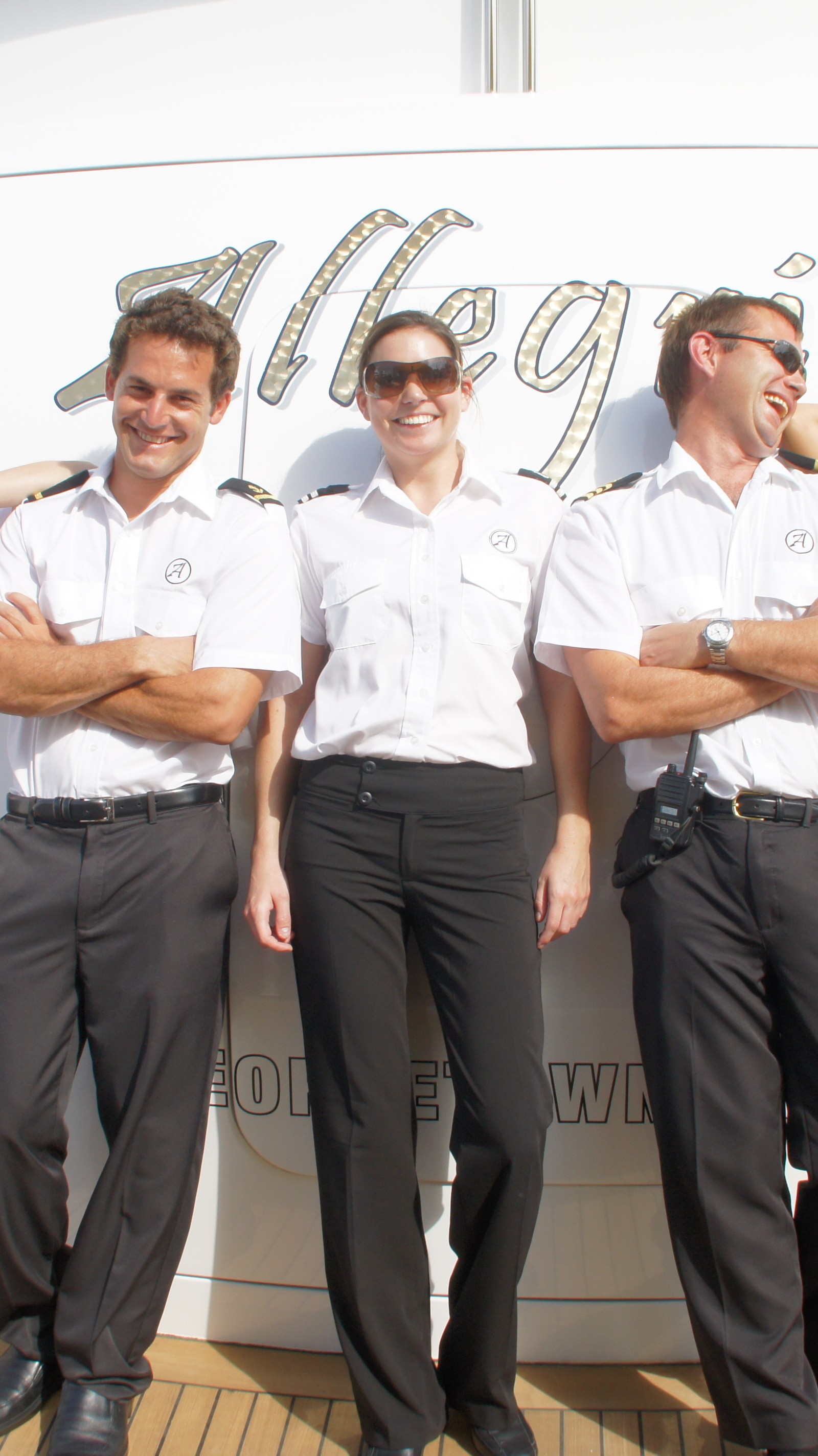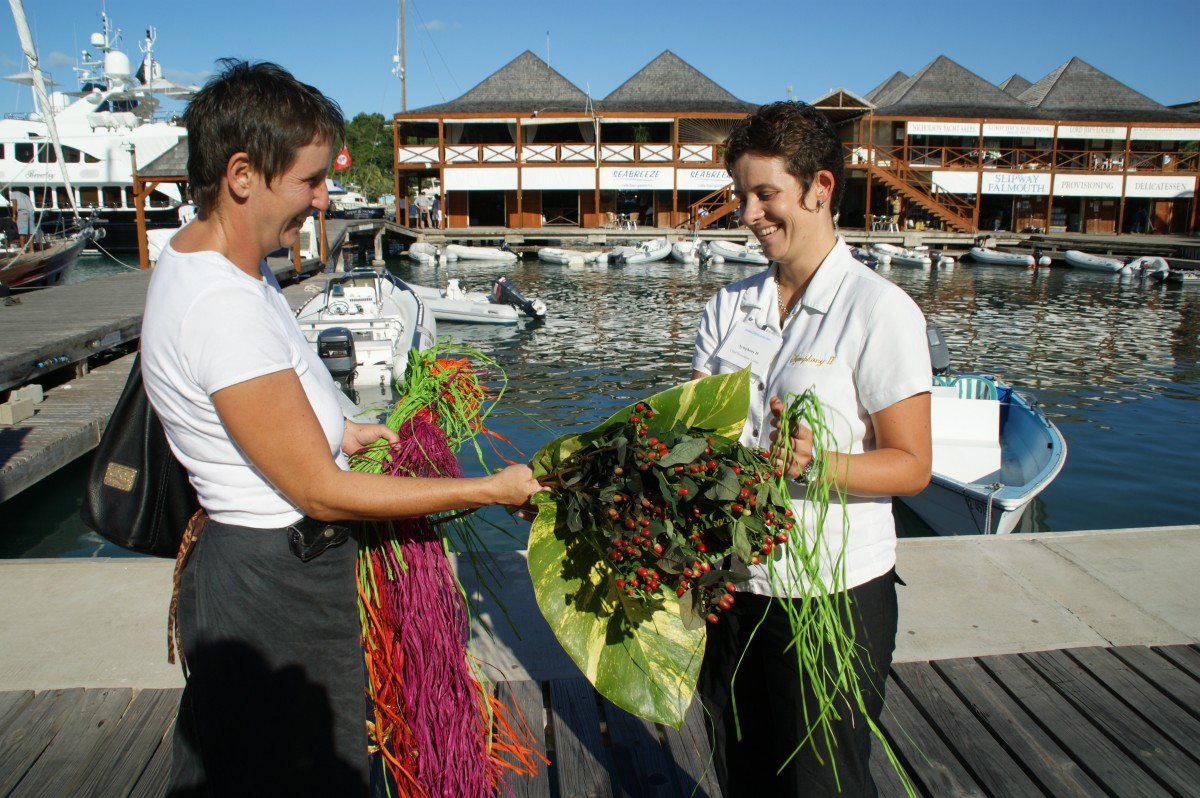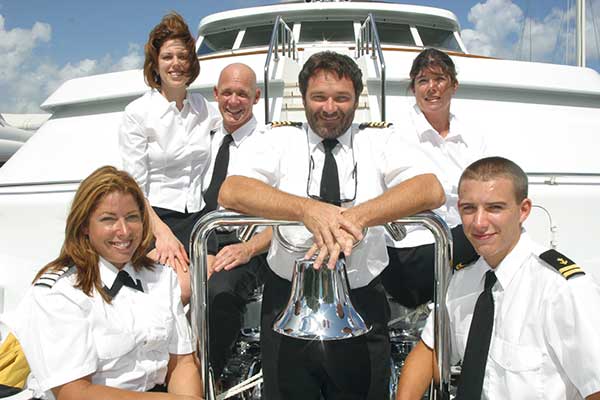Working On Yachts
There are currently over 15,000 yachts in the world large enough to require professional, qualified yacht crew and as a result this industry is growing rapidly each year.
A career in yachting can be rewarding, exciting and a wonderful opportunity to travel the world and explore new horizons!
Wherever there is water, you have the potential to go. Traditionally the yachting industry in the Mediterranean runs from April until September and from November to April in the States & Caribbean. Having said that, the possibilities are endless with many yachts circumnavigating the world.
Yachting is an eye opening, ultimately fun industry that demands hard work, perfection and attention to detail. We work with yacht crew every day and have a deep insight into what new crew should do to make the most of their career. Here are our top ten tips for starting out.
You cannot work on board a luxury yacht without getting your basic qualifications first. Bluewater offers a full range of crew training courses for those just starting in the industry:
- STCW 95 Basic Training (Europe) 5 Day Course
- Powerboat Level II 2 Day Course
- Interior Introduction 3 Day Course
- AEC 1 5 Day Course
We have a sample copy and lots of relevant advice on creating your first yachting CV within our 'Your CV' section.
Certain times of year are more favourable for new crew looking to join the industry. If you are going to Antibes or Palma, we advise end of March/April. Fort Lauderdale is different in that it is sunny most of the year, however there is a peak recruitment season around November each year.
In every yachting hub you will find english speaking bars and cafes filled with yacht crew. Make sure you go and explore to build your network within yachting. Although global, it is a small industry so make sure to present yourself professionally.
Finding your first position in yachting is the hardest. Make sure you are dock walking, looking for day work opportunities and handing out your CV. You may find that one day's work leads to a permanent role or other job interviews.
Read websites, follow yachting news, learn from other crew who were in your 'deck shoes' a few years ago. Good examples of yachting websites & magazines are:
- Bluewater bluewateryachting.com
- Dockwalk dockwalk.com
- The Crew Report thecrewreport.com
- The Triton thetriton.com
Apply for jobs, manage your course bookings and sign up for events.
You can buy pay as you go SIM cards either in newsagents or specialised telephone shops around the Mediterranean. This will help to save you money when job hunting!
Captains check Facebook and Twitter pages before interviews. Make sure any public images of you are professional and will not reduce your chances of employment. Once employed be sure to avoid any posts about your yachts, current location and inappropriate images.
A smart, professional appearance will win over shorts and a beach top.
The most important aspect when you are looking for work is to make sure your CV is up to date, well written and includes any relevant experience that you might have.
It is best to emphasize any hospitality experience or customer service skills you may have had, such as waitressing, hostessing, silver service, bartending, cooking, nanny/au-pairing, babysitting, flower arranging, cleaning and/or laundry experience.
Should you wish to join the engineering department, make sure you include all mechanical experience and qualifications, including all work done in refrigeration, air conditioning, work with engines, and any electrical work, electronics or AV/IT.
The most important aspect to include is any recreational sailing experience you may have had. If you are also qualified or experienced in woodwork or carpentry, have painting, polishing, varnishing know-how, then that is also great. In addition any diving, sailing, fishing, any water sports background are all fantastic skills that are easily transferable.
We deal with a great multitude of chef positions, ranging from crew chef to head chef. Most positions will require some form of culinary training, however some crew succeed in entering this department through the stew/cook route on a smaller yacht.
When filling in your online profile with us, make sure to only select positions that you are qualified to do onboard. Selecting more than 3-4 positions on your profile can confuse potential employers and effect our search results.
Your CV should be no more than two sides of A4, including your photograph (in colour, face on, without sunglasses).
Your CV should be in a word format to ensure it can be opened easily by all employers.
List all recent contact information, references and work history.
Including a personal statement, along with a clear objective can help distinguish you from other candidates and helps prospective employers grasp your long term goals.
Don't give employers an excuse to dismiss your CV, review and spell check it!

Salary Guidelines

Knowledge is power and the more you research, the more informed & on the ball you will be.
Make sure you have a printed copy of your CV with you and always arrive early and dressed in a smart way. Research the yacht, make yourself prepared & don't be afraid to ask questions.
The key to getting your first job is to network! Always carry a copy of your CV with you.
Remember the industry is a tight, professional network therefore it is crucial to communicate with others, walk the docks, distribute your CV and register with crew agencies. Bluewater is one of the longest-established crew agents - we have been finding people yacht jobs since 1991!
Keep the agencies up to date! Always make sure your profile has the correct location and contact numbers for you so we can get hold of you when we have the perfect role for you.
Your profile is essential to us finding you work, both now and in the future. We rely on the information you input to match you to the right jobs, so please make sure it is up to date and at least 85% complete. We receive thousands of vacancies each year, and search our database for the best candidates for each one... You will hear from us more often if you are checking in regularly! Once you find work you can set your profile to 'Not Available'.

Working On A Yacht? 9 Things To Consider + Salary Examples
Working on a yacht gives you the ability to spend your days and nights at sea while exploring fun and far-off places.
For this reason, many people wonder how to get into the industry and what other things they need to know about working on a yacht.
In this post, we’ll talk about the top 8 things to consider before getting a job on a yacht.
We’ll also talk about how much yacht workers earn:
Table of Contents
Are You Qualified To Work On A Yacht?

According to BlueWaterYachting, there are about 15,000 yachts in the world that are large enough to require a professional yacht crew.
This might sound like a lot, but not when you compare it to the number of people that would like to work on a yacht.
To set yourself apart from these people, you’ll want to have experience in whatever position you’re looking to fill.
Wondering what types of jobs exist on a yacht?
6 popular jobs you might hope to get on a yacht:
There are also other yacht-specific jobs that might come up as well. For instance, I saw a yacht that had two professional massage therapists on board.
These people might not be needed on every yacht like a captain would be, but they were needed for this particular yacht.
In addition to general job specifics, you’ll also need to be trained to work on a boat.
Many different companies offer short courses that will teach you the basics of yachting as well as the basics of first aid and water rescues.
You Need People Skills
Another thought to consider is that you’ll need to have superior people skills when working on a yacht. Remember, you’ll be in close quarters with a small group of people day in and day out. If you’re angry at a coworker or customer, you won’t have the ability to go home to get away from them at the end of the day.
For this reason, it is important that you’re able to get along well with others.
Also, remember that a yacht crew is often very diverse. People on your crew might come from different countries where the cultures are quite different.
You’ll need to be able to learn these people’s social customs and you’ll need to be comfortable with the fact that they might still be learning about yours.
Getting to know new people and new cultures is very rewarding but it can be difficult at first. You’ll need to be willing to work much harder at it on a boat than you would at a typical 9 – 5.
What About Sea Sickness?
Are you prone to motion sickness? If so, working on a yacht might not be the best idea. Getting sick on a short cruise might not be a big deal. The cruise is over in a few hours and shortly after you arrive on land, the seasickness goes away.
However, if you’re sick on an ocean voyage, you might be sick for days or even weeks at a time.
Before signing on to work on a yacht, you might want to take an ocean voyage to see how your body will react. It would be sad to get signed on to a three-month job only to find that after a few weeks you’re just too sick to continue.
Is there anything that can be done to stop seasickness?
Luckily, many people have found that their tolerance goes up over time. However, some people never get used to the sea and they will always be sick while traveling on it.
These people might want to change industries or find a more stable boat that does not go out in rough waters. For example, a person that gets seasick on the ocean might be perfectly fine working on a party boat on a river.
How About Your Health?
Another thought to consider is the fact that being at sea limits your ability to get medical care and medicine. People with long-term diseases might want to think twice before working on a yacht.
Imagine you have to take daily medication to stay healthy. Now imagine that this medicine does not show up at your next port. Will the yacht owner stick around to get you your medicine?
What happens if you don’t get your medicine? Will the disease become irreversibly worse?
People with health issues may want to resolve these issues before they look into a career on a yacht.
Otherwise, they might want to work on a yacht that does not do long trips. If your yacht only does weekend trips, you could always store extra medication on the boat to ensure your safety.
Privacy Issues To Consider
Privacy can certainly be at a premium on a yacht. Crew quarters are almost always shared quarters and you may not even have your own bed.
I’ve seen some ships where two people on different shifts share the same bunk.
For some people, this isn’t a big deal, for others, it could be a nightmare.
Also, remember that you’ll always be in close contact with other people. If you’re an extrovert the yacht could seem like paradise. However, if you’re more introverted and need to have a significant amount of alone time to be happy, this might not be the job for you.
Getting any real time to yourself on a yacht can often be an impossibility.
In fact, even extroverts may want to bring a set of earplugs with them so that they can get some peace and quiet from time-to-time.
How About Your Friends and Family
Setting sail across the ocean on a yacht while getting paid to do so can be a dream for some people. In fact, it might be a dream of yours. But, have you thought about your family and friends.
When you’re off on a 12-month voyage, you won’t be able to see your friends and family.
Depending on your situation, you might have to miss people’s weddings, graduations, birthdays, and many other momentous occasions. You may also find that when you get back, some of your personal relationships just aren’t as close as they used to be.
In fact, some of your friends may even resent you for leaving.
On the other hand, it is easier than ever to stay in touch with friends and family member while staying out of reach. With emails, satellite phones, and video calls, you can continue to cultivate relationships from afar, you just might have to work harder at it.
Seasonality For Working On Yachts
Jobs on yachts are often seasonal and can often be unsteady.
Some larger charter yachts might have a crew throughout the entire year.
The company that owns these yachts will want the crew ready to set sail for any customers they might get. In this case, the crew may only have passengers a few months out of the year.
Other jobs on yachts might only last a season. In fact, the most in-demand yacht jobs are usually only three months. This can be great for students and teachers looking to fill their summer up with a fun and interesting job.
For others, this kind of work might not be steady enough.
Availability
A potential yacht worker might also want to consider their availability. Jobs are more likely to appear around June and end in September. If you’re not available during these months, you may find that jobs are harder to acquire.
You’ll also need to be very flexible when it comes to availability.
These jobs can come up quickly and they can be filled quickly as well.
When a yacht owner wants to set sail it can often be at a moment’s notice so you won’t have much time to think about whether or not you want to take the job.
Wait a few days to respond and the yacht may have set sail by the time you answer.
What’s The Salary For Yacht Captains + Crew Members?
The salary of a yacht worker will vary, mostly based on the job title and job responsibilities.
Here are some example salaries of jobs that you might do on a yacht:
- Yacht Captain Yacht captains often receive large salaries. This salary is typically based on the size of the yacht that they are working on. According to CNN, this job is a six-figure job that can often range from $100,000.00 to $250,000.00. The reason this job pays so well is that it can be a stressful job. Captains need to be available 24 hours a day. They also have to be skilled in both managing people and operating large ships.
- Yacht Engineer/Deckhand These crew members will often average around $48,000.00 a year or $4,000.00 a month.
- Steward/Stewardess This crew member will average between $30,000.00 and $45,000.00, depending on experience. More experienced stews will often manage the other stews so they’ll end up earning more money for doing so.
- Yacht Chef The yacht’s chef usually makes six figures as well. This is because the chef is expected to be an experienced chef that can make luxury meals while out at sea.
Here’s everything you need to know about exactly how much the yacht captain and crew make .
They actually also make quite a decent amount of money from tips given by the owner’s guests .
Final Thoughts
Working on a yacht can be a fun and lucrative experience.
Just know that there are some challenges and be prepared to meet them when the time comes.
Click to share...
Impartial training and careers advice
Call us: +441983 280 641
+441983 280 641
Superyacht Crew Salary Guide – 2023
- Superyacht Crew Salary Guide – 202...
Working as a crew member on a Superyacht has some incredible perks…
… from being on the ocean and seeing new countries to brushing shoulders with the rich and famous and, of course, earning an amazing salary.
As we begin 2024, we thought it a good opportunity to look back at 2023 to see how the industry faired and whether there have been any changes to salary, tips, and working conditions.
The good news is that things have got better! Since the pandemic, the Superyacht industry has seen significant growth the industry has grown significantly over the last couple of years .
As the number of Superyachts being built increases, so does the demand for crew; there has never been a better time to enter the industry.
Typically, the entry-level salary for a Deckhand and Steward/ess ranges between €2,000 and €3,500, rising to €4,000+ for more senior roles. A Captain can make €10,000+ per month, depending on the size of the Superyacht!
Moreover, as you’ll be living onboard the yacht, there are no living expenses to worry about. Your meals are prepared by the Chef onboard, too, and you rarely need to buy groceries or toiletries.
We can’t talk about Superyacht Salary without mentioning tips. The majority of Superyacht owners charter their yachts as the ultimate holiday experience! A Superyacht does not come cheap, with some chartering for One Million per week! Guests normally leave a tip and around 10% of the charter fee, which is shared equally among the crew. It is not unheard of for a Deckhand or Steward/ess to receive a €5,000 tip after a week’s trip!
Another huge benefit contributing to the amazing Superyacht salary is the potential for tax-free earnings (typically paid in Euros)!
Read on for our complete guide to the Superyacht crew salary for 2023…
How much do you make working on a Superyacht?
In short, your salary will depend on the role you work in on the Superyacht, in conjunction with its size; however, the average salary is €2,500 per month (most boats pay in Euros rather than pounds).
Several other factors will determine Superyacht crew salary, too, including previous experience, qualifications, and extra skills (such as Dinghy Instructor, Carpenter, and Divemaster, to name a few).
Whether the yacht is chartered or privately owned will all contribute to your monthly pay packet; your basic salary will be the same whether you work on a charter yacht or a private boat, though on a charter, you will generally receive tips; this usually around 10% of your monthly salary, or it can range between €1,500 to €5,000+ .
We’ve shared current Superyacht salary approximations for 2023 in the table below:
How much do you make working on a yacht?
Here’s a breakdown of superyacht crew salaries in more detail by role:, superyacht captain salary – €4,000 to €16,000+.
A Superyacht Captain is responsible for all activity onboard, crew safety and well-being, and the experience offered to guests.
The Captain is the owner’s main point of contact on the yachts; whether things are going right or wrong, it can be a highly pressured and stressful job.
The salary reflects the responsibility in this high-pressure environment, and the range in salary normally depends on experience and the boat’s length.
Generally, larger boats will carry more guests and staff; therefore, the Captain will have higher responsibilities, a bigger budget, and more challenges to cope with.
First Officer salary – €3,200 to €8,000+
The First Officer, also known as Chief Officer or Chief Mate, is always second in command to the Captain.
They will assist the Captain in a wide range of duties and tends to be responsible for the safety of the Superyacht and everyone on board. Furthermore, the role of the First Officer also includes bridge watches and navigation.
Due to needing a firm understanding of working on deck, the First Officer normally starts their career as a Deckhand and progresses from there.
If you are an experienced First Officer and have moved onto larger yachts, then your next step will be to become a Captain.
Superyacht Bosun salary – €3,200 to €5,000+
Otherwise known as the Senior Deckhand, the Bosun is the ‘line manager’ of all Deckhands on the boat. The responsibilities of the Bosun are to manage and maintain the exterior of the yacht to the highest order.
This role also includes spending time with the guests, making sure they are having fun and are safe on all the toys the Superyacht has, such as jet skis and dinghy sailing boats.
Chief Stewardess salary – €2,800 to €7,000+
The Chief Stewardess is responsible for the interior of the Superyacht. Attention to detail, elegance,
and cleanliness is paramount for this role.
Moreover, you will be required to perform duties discreetly and anticipate the requests and demands of guests, as well as manage your team of Stewardesses. A managerial background in hospitality will therefore help for this role.
Generally, the Chief Stewardess will have gained previous experience in an entry-level Stewardess role and fully understands the functions of a working Superyacht.
Superyacht Stewardess salary – €2,000 to €3,500+
This is an entry-level position working on board a Superyacht.
Open to Male and Female
Being a Superyacht Stewardess is a wide-reaching role covering three main areas: Service, Housekeeping, and laundry. Your actual day-to-day activities can vary depending on the type of yacht (private or charter), owner, and Itinerary. You will be the host, cleaner, florist, and housekeeper, and collectively responsible for looking after the guests 24/7.
If you are looking at not going to uni , and want a career with real progression and a very good salary, becoming a Superyacht Stewardess could be for you! If you would like to start a career as a Stewardess, then consider joining our Superyacht Steward/ess course.
Superyacht Deckhand salary – €2,000 to €3,500+
This is another entry-level role to work on a Superyacht.
Open to male and female
A very hands-on role, the Deckhand is responsible for the exterior of the yacht, and tasks will typically involve cleaning, painting, sanding, varnishing, and all general maintenance of the boat.
As with all Superyacht roles, working as a Deckhand requires some skills and qualifications before you start looking for work. The good news is that you don’t have to go to Uni to get whats required. You will be able to get qualified in a few weeks.
How to become a Superyacht Steward/ess or Deckhand.
If you want a career in the Superyacht Industry, we are here to help. Contact us by phone, email, or live chat. Alternatively, book a meeting with one of our career advisors.
Looking for more information on working in the Superyacht industry?
Download our free guide and learn all there is to know about working on a superyacht as a deckhand or steward/ess., related articles.
- Seafarers Tax
5 ways to ensure your SED claim is rock solid
The Seafarers’ Earnings Deduction, often referred to as the SED, is a tax legislation that enables seafarers to claim back their UK income tax. It a...
Do I need to pay off my Student loan if I work on a Superyacht?
Good question! First, let me say that the information below is aimed at people who have studied in the UK and took out a Student Loan to cover course ...
Have I got the right experience to work in yachting?
If you’re thinking about working on board a Superyacht, we share the skills and experience you need and how to get into the yachting industry in thi...

- Connect with Us
- Like us on Facebook
- Follow us on Twitter
Yacht Crewing 101 - Getting Started!
Have you ever looked longingly at those huge luxury yachts in ports like Miami and Ft. Lauderdale in Florida and wished you could sail away to anywhere on the next one that pulls up anchor? If the answer to that question is yes, then you are already half-way to becoming a yacht crew member. Most crew members say that the Number 1 quality yacht owners and operators look for in their onboard staff members is a love for yachts and the ocean. But there's more to working on a yacht than you might think.
Here's the basic information you need to help you make a decision about whether yacht crewing is right for you.
Who Makes the Best Crew Members?
First you might be wondering if working on a yacht will work for you and your lifestyle. Here are some points to keep in mind that can answer that question.

- The pay can be great- or not. Entry level crew members typically receive the lowest pay, but you can work your way up. Captains, team leaders, and similar crew members can make between $2,000 and $4,000 per month or higher. If you're working abroad your salary may not be subject to U.S. taxes, plus you won't have rent, groceries, and other bills to pay, so the salary can go father.
- Your bosses can be demanding. If you work on a privately owned yacht, then you'll be working directly for the yacht owner. Of course yacht owners can be great to work for, or horrific - just like any other boss. It's true, however, that most yacht owners expect great service. They want the yacht to be spotless and the food great - all while being served with a smile.
- The hours can be long. While you are cruising you can find yourself working from 6:00 AM to midnight in order to meet your passengers' needs. Sometimes you may not have much of a break throughout the day.
- The work can be never-ending, and requires physical labor. You need to be physically fit and prepared to work on your feet for long periods of time. You may have to scrub toilets, as well as the exterior of the yacht. It's not glamorous work, even though some of the benefits can be.
If after learning that the work can be sporadic, often low paying, and involves a lot of physical labor and long hours you still like the idea of working on a yacht, then yacht crewing is definitely right for you. And you won't be alone. What crew members love most about yachting is the ability to travel to some of the world's most beautiful locations, the camaraderie of working as part of a team, and the joy of being out on the open ocean. They find that the positives far outweigh the negatives.
Don't be stuck with a boring job! Search for your Dream Job Today!
How to Get a Job on a Yacht and Travel the World
Posted by Di Minardi | Last updated Nov 6, 2022

This post contains affiliate links.
Have you ever thought about getting paid to sail around the world?
That’s exactly what happens when you get a job on a yacht.
I’ve made it my mission to help people find ways to work and travel full time, like teaching abroad or starting a digital marketing agency , and now I’m going to break down exactly how to find work on a yacht.
I talked to my friend Jack who’s been in the industry for three years, and he gave me all the insider info you need to know to get a job on a yacht.
Jack has had years of experience sailing, so he works onboard a superyacht as a first mate. However, if you’re reading this you probably (like me) have zero experience working on boats. So, I’m going to focus this article on the lower level jobs available: the stewards, stewardesses, and deckhands.
Basically, the steward/stewardess works inside and cooks, cleans, serves the guests, etc. while a deckhand does the maintenance, repair, and physical labor type jobs. Both of these positions can be filled by people with one certification and zero experience.
Ready to get a job on a yacht? Here is everything you need to know!

Average Income: $2,500 per month and up
Free Housing/Utilities: Yes
Tax Free: No
Healthcare: If you’re crewed on an American boat, healthcare will be provided. On international boats, probably not.
Free Flights: Boats won’t fly you to them unless you’re very experienced. It’s better to go to the ports to find a job.
Certifications: You need the SCTW certification . The bad news is this certification requires passing a week-long $900 class in Ft. Lauderdale. The good news is that afterward, you can job hunt on Ft. Lauderdale’s ports.
Contract Length: Contracted jobs for the steward/deckhand positions can be seasonal, so if you just want to jump aboard for a trip around Europe or the Caribbean for a few months, it’s definitely possible.
Where to find yacht jobs: Jack suggests going to a yachting hub and walking around the port to hand out your resume and ask for work. Consider Fort Lauderdale, Monaco, Malta, the French Riviera or anywhere in the Caribbean. You can also search for yacht crew jobs on the sites below:
- The Crew Network
- Cruise Job Finder
- JF Recruiting
- Crew Finders
Ok, let’s start with a finance breakdown. How much will you get paid to work on a yacht, and how much can you save?
Deckhands and stewardesses get around $2,500 per month or more and should not accept less than that. First mates with experience make around $6,000 a month and captains make around $12,000 a month… so, if you work your way up the ladder it’s definitely a lucrative career.
On the other hand, if you work on a chartered yacht the salary will be lower but you also have the chance to make bank with large tips. As a whole though, working on a boat with one owner (rather than chartered) provides more predictable and steady income and work.
The best part about working on a yacht is that you will have zero expenses.
There are no bills to pay because you live full time on the boat. So, what’s it like? Jack says it’s usually a small room shared with one other person. The living spaces can feel a bit cramped but they’re also free soo… not bad!
However, this does mean that your yacht coworkers really become your family. You live together, you work together, and you really can’t escape each other. If you’re prone to drama or need a lot of personal space, this may not be the ideal living situation for you. But if you want to save lots o’ cash, it definitely is.

How to Get a Job on a Yacht
The best way to get a job on a yacht is to travel to one of the yachting hubs and physically hand out your resume on the docks there, old school style.
It goes without saying that if you’d like yacht jobs in the Caribbean, you need to look for work in the Caribbean, and if you want yacht crew jobs in Europe, hit the European hubs.
Interestingly, American boats have to be crewed by Americans. If you’re American, the best place to find yacht jobs is in Ft. Lauderdale, and if you’re not from the US you may not want to head to the States to get a job on a yacht because it will be much harder to find.
If you’re just starting out you will work a labor job like a deckhand or a service job like a stewardess. However, there are also yacht jobs on boats for many different specialties.
Chefs, nurses, and dive masters are all in high demand. If you have your certifications and experience in these fields, getting work on a yacht could be an awesome escape and way to travel the world while making money for a year or two.
What if you have no experience?
Well, you will at least need the SCTW certification which does qualify you to work on any boats. But we all know it’s not that easy.
One great way to get some experience on your resume is by doing “boat delivery.”
Basically, this is exactly what it sounds like. You work on a boat for free, and help move it from one place to another when the owners are changing ports for the season. You won’t get paid, but the owner will cover your food and expenses and even fly you home once the boat is delivered to its location.
For example, you can help sail a boat from New York to Florida, spend a few days down there for free, then get flown home on the owner’s dime. It’s not ideal, but it’s a good way to pad your resume with boating experience.
How Much Can You Travel When You Work on a Yacht?
Now for the most important question… how much travel can you do while working on a yacht?!
Based on Jack’s experience, the answer is a lot. In the past three years he has been to all of the Caribbean, a dozen European countries, South Africa, the US, South America and more… all for free on the yacht .
If you land a job to work on a yacht, you’ll work five days a week just like any other 9 to 5 gig. Guests on the yacht always come first, but for the most part, you will have two days off, even if it’s irregular or a weekday. Those days off can be spent exploring the city your boat is ported in, and spending some of your hard earned cash.
When it comes to vacation days and time off, that’s a bit more irregular.
Low-level yacht crew typically earn two days of vacation per month working. Jack emphasizes, though, that the boat owns you. The schedule is irregular and you have no control over it, and taking these days off isn’t very easy.
The longer you spend working on one yacht and the more experience you have, the more vacation you will get. Jack hasn’t taken any vacation days in the first 10 months of 2017, but he’s scheduled to have November and December completely off (and completely paid).
These kind of long breaks are perfect for travel, and during his vacations in the past, Jack has been able to see the world on the yacht’s dime.
Lifestyle On Board the Yacht
Is getting a job on a yacht right for you?
This could be a perfect job if you enjoy sailing and prefer the opportunity to travel over owning material goods. Jack says working on a yacht is best for people who already enjoy being on the water or have sailing experience, but that anyone can do it. The biggest con is definitely giving up personal space, privacy, and control over your life.
But the pros outweigh the cons for him.
As a first mate, he’s making more money than he ever would working with his college degree and is saving to go to law school debt free. He says this isn’t the career path he wants to follow forever, but if you start out on the low levels and enjoy it, there is a lot of room to grow.
Yacht owners often provide learning opportunities and certifications to the crew who want them, making it possible to move up the ladder and become a captain someday.
Get on a boat that is heading to countries you want to see, and you’ll be paid to travel and visit them.
Most boats operate on a seasonal schedule, like the Caribbean in the winter, Europe in the spring, or the Mediterranean in the summer. Find work on a boat with a schedule that interests you, and you’ll definitely enjoy the trip!
Get Paid to Travel the World!
Use this guide to learn how to get a job on a yacht and see the world while making money.
If you’re young, single, and up for an adventure, this could definitely be a great move for you! There are also available jobs for many different specialties, and lots of room to move up in a career in yachting.
Travel to dozens of countries on someone else’s dime and live for free for a few years… what’s not to love? Sounds pretty good to me!
This article is part of the See the World series. Read the rest below:
How to get a Job in Antarctica (Even if You’re Not a Scientist)
Most People Have Never Heard of Kwajalein: This is Why You Should Work There
How to Teach in Abu Dhabi and Dubai
Everything You Need to Know to get a Job as a Flight Attendant
Everything You Need to Know to Work as an Au Pair
Travel for Free With the Beginner’s Guide to Housesitting
Or, explore the complete Working Abroad series for more step-by-step guides to making money while you travel!
Did you know every time you read an article on Slight North, you're also planting trees for the monarchs in Mexico? Start here to learn more about our mission and how to get the most out of the site!
Related Posts

Sygic Premium Travel App Review
Last updated Nov 6, 2022

How to Fly on a One Way Ticket to South America

Indonesia vs. Thailand: Which Should You Visit?

Georgia vs. Azerbaijan: Which Should You Visit?
Let’s connect.
Recent Posts
- 2020 Year in Review: the Good, the Bad, and the Ugly
- Best Places to Go Hiking in Las Cruces, New Mexico
- Why You NEED to Celebrate Small Christmas in 2020
- 7 Best Restaurants in West Hollywood (From a Local)
- The Complete Guide to Craft Beer in Las Cruces

Work On A Yacht

From the Blog Subscribe Now
Official Yacht Stewardess Job Descriptions and Salaries (Including a Salary Chart)
June 12, 2018 By Julie Perry
For some even more straight-from-the-book fun, I present to you below the official job descriptions for the various yacht steward/ess roles. These are pulled directly from The Insiders’ Guide to Becoming a Yacht Stewardess Chapter 3—a chapter that actually contains descriptions for each of the positions onboard, from Captain to Engineer, and from Executive Chef to Deckhand. And they are all presented with accompanying salary ranges.

The Crew of Megayacht “Allegria” (2010). Photo by Suki Finnerty of YachtingToday.TV
So if you’re interested in a yachting career in another department outside of a superyacht’s interior, consider picking up a copy of my book to learn more . (The “how to get started” information in Part II of the book really does pertain to most any entry-level position.)
Official Yacht Steward/ess Job Descriptions
Meanwhile, here are your yacht stewardess job descriptions, with a detailed salary chart found at the end of this post:
CHIEF STEWAR/DESS (Annual Salary Range: $39,000–$96,000+)
Job Function —The chief stewardess will carry out his or her duties and responsibilities under the direction and authority of the captain. As the person ultimately responsible for the interior of the vessel and for providing superior hospitality service to meet the owner’s and guests’ expectations, the chief stew will also train and manage any lower-ranking stews under his or her supervision. Excellent service, host/ess, and managerial skills are a necessity, as is having a good degree of creative flair.
Responsibilities
- Responsible for the everyday smooth operation of the boat’s interior department, which means being adept in the arts of housekeeping services, laundry procedures and wardrobe management, food and beverage service and cleanup, and entertaining (while maintaining proper etiquette and a high-energy, can-do attitude at all times)
- Responsible for directing, motivating, and training the lower-ranked stews (2nd, 3rd, and so on)—if any are onboard—which includes the assignment and scheduling of rotational duties and implementing Human Resources (HR) procedures and guidelines
- Providing valet services and overall guest care. Note: In the hospitality industry, “valet” refers to any employee who performs personal services for guests (and refers to more than just parking cars, which is what we normally associate it with). With regard to yacht stews, valet services include tasks such as packing and unpacking guests’ luggage, caring for their personal items and specialty garments, and even making daily activity arrangements for them.
- Protecting, maintaining, and caring for valuable interior items and surfaces, such as artwork, silks, china, crystal, linens, fine woodwork, and marbles
- Creating, implementing, and monitoring a financial planning system that includes accounting and budgeting for interior department needs
- Creating, implementing, and maintaining an informational management system of interior inventories and maintenance procedures
- Provisioning to maintain inventory supplies and cover guest usage
- Collaborating with the executive chef regarding meal service for the guests
- Creative planning and quality service of theme dinners and occasional guest parties
- Keeping all interior storage areas organized, orderly, and maintained
- Crew uniform purchasing
- Writing and updating all interior manuals and guest-information documents
- Maintaining and displaying knowledge of international etiquette and protocol
- Watchkeeping in accordance with the list of responsibilities in the crew mess
- Exterior-crew support as needed (requiring proficiency with exterior lines and fenders)
- Selecting, purchasing, and serving fine wines, specialty teas, and cigars, which may require advanced training
- Planning and managing destination experiences proficiently
- Assuming full responsibility for certain onboard safety tasks (as assigned by the first mate) in an emergency
Qualifications —A chief stewardess should possess some type of training and experience in the areas of bartending, silver service, cigar service, and wine presentation and service. (The more extensive a stew’s wine knowledge, the better.) STCW BST certification is now mandatory for a chief-stew position, and previous yachting experience on either charter or private vessels is most always required. It is also recommended that you obtain an ENG1 Seafarer Medical Certificate, or its equivalent. Floral arranging and table decorating skills prove to be an advantage, while an Advanced/Medical First Aid Certificate or a higher degree of medical training is also a major bonus. In fact, many chief stews are now taking courses to become certified as a yacht’s Medical Person-in-Charge. This requires a seven-day course that will satisfy the standards set forth by the STCW Code A-VI/4, 4.4-4.6, offered at many of the marine training schools. While the new PYA Interior-Crew G.U.E.S.T certification is not mandatory (as of July 2013), it is wise to follow the courses outlined and seek out equivalent intermediate and/or advanced interior-crew training classes, if not sign up for the full PYA G.U.E.S.T course modules.

A Chief Superyacht Stewardess handles the ordering of provisions and other guest amenities for the yacht, which might include things like floral displays that the interior crew is too overwhelmed to handle on its own. While that may sound like an easy task, consider that no matter how many years a yacht stew has been doing this job, he or she will always end up in a new port (sometimes half-way around the world). First, he or she must find a reputable vendor. And not only do fresh flower arrangements need to be ordered, but they must be paid for as well. A chief stew must keep thorough accounting throughout a trip and make sure all vendors and provisioners are paid from the right accounts. Photo Credit: Suki Finnerty of YachtingToday.TV.
STEWARDESS—2nd and 3rd Stews; sometimes referred to as Senior and Junior Stews (Annual Salary Range: $30,000–$54,000+)
Job Function —A 2nd or 3rd stew will carry out his or her duties and responsibilities under the direction and authority of the chief stew and the captain. Individuals holding these positions are responsible for assisting with the maintenance of the interior of the vessel and providing superior hospitable service, in line with the owner’s and guest’s expectations. Hostess skills should be well developed to fully accommodate the owners and their guests while onboard.
- Maintaining interior housekeeping during a trip (detail cleaning) while also being held largely responsible for guest-cabin care
- Laundry, ironing, and other wardrobe maintenance tasks for guests and sometimes crew (when guests are onboard)
- Applying excellent guest service (including silver service) and expert bartending skills when called upon
- Guest care and valet services
- Assisting in the creative planning and quality service of theme dinners
- Assisting with physical product inventories, provisioning, writing and updating checklists, and all other applicable tasks within interior
- Exterior-crew support as needed
Qualifications —This is an entry-level position; while previous yachting experience is not required, it does bring added salary benefits. STCW BST certification is now mandatory for obtaining even entry-level work on a megayacht. It is also recommended that you obtain an ENG1 Seafarer Medical Certificate, or its equivalent. Table service, bartending, and cocktail-service experience or equivalent qualification are crucial to landing a job—training and certification recommendations for these can be found in Chapter 7 of The Insiders’ Guide to Becoming a Yacht Stewardess. While the new PYA Interior-Crew G.U.E.S.T certification is not mandatory (as of July 2013), it is wise to follow the courses outlined and seek out equivalent introductory interior-crew training classes, if not sign up for the full PYA G.U.E.S.T introduction modules.

Yacht Stewardesses at Work Photo Credit: Suki Finnerty of YachtingToday.TV
Dual Positions
On smaller and midsize vessels, where not as many crewmembers are needed (nor is there room for them), the core crew positions listed in the last section are often fused into what I call “dual positions.” An individual hired into such a position will assume a dual role and be expected to wear more than one “hat” during the course of a day.
Here are some examples:
- Deckhand-Stew
- 2nd Engineer-Deckhand
- Captain-Engineer
- Stew-Purser
Steward/ess Salaries
According to Dockwalk’s annual Crew Salary Survey in September 2013 , steward/esses are making a wide variety of salaries these days, and the amount of experience and training they have makes a difference. Of course, the size of the yachts will also be a factor. Compensation for chief stews runs anywhere from $3,450 to $5,650 a month on smaller yachts (80 to 140 feet) to $5,200 to $8,000 a month on yachts over 140 feet. It is very common now to see $65K and $70K salaries, or even $90K+ on the much larger vessels. Salaries for entry-level yacht stewardesses start out between $30K–$43K a year, or $2,500–$3,600 a month.
Base salaries for stewardesses, when compared with those of food and beverage servers, cabin stews, and laundry staff on cruise ships, are slightly higher. But where the potential income differences become dramatic is when you consider the tips one can earn working on luxury charter yachts, or the bonuses and perks afforded the crew on solely private yachts.
Here is a table that sums up salary ranges for the various stew roles within the interior department on a megayacht / superyacht:
Steward/ess Salary Ranges
While annual salary guidelines are given above, again, keep in mind that the ranges are wide because salaries will depend on a variety of factors, including the size of the yacht, the use of the yacht (private or charter), the style of boat (power or sail), and what other benefits are available to the crew, such as insurance packages or education reimbursement. Salaries may also vary depending on the specific qualifications of a crewmember, the amount of time the owner and guests use the vessel, and what itinerary will be traveled. Furthermore (and I cannot emphasize this enough), the compensation ranges listed are base salaries and do not reflect tips, if those are applicable.
Yacht Crew Have Got 99 Problems, But Living Expenses Ain’t One of Them
The first thing people always say after I give them the above salary figures: “Gee, is that all? I thought you said it paid well?” And someone will always add, “Oh, well I can get paid that same amount to take an entry-level office job.”
But here’s the kicker: no expenses.
Most all positions on luxury yachts require you to live aboard and travel with the vessel, and therefore, your room and board are completely covered. It is customary and expected that everything you need on a daily basis is provided by the yacht owner—your meals, your uniforms, laundry detergent, linens, and on most boats, even your personal hygiene products, such as soap and toothpaste. Meanwhile, your earnings automatically go into your bank account.
What other job can you take where, at the end of the year, you have nearly your entire salary sitting in your bank account, relatively untouched? Most people in other industries are lucky if they save 1/10 of the amount they earn in a year. Why? Because they are paying rent and utilities, buying and maintaining cars, and purchasing all the clothes they wear to work each day. And let’s not forget groceries.
Ready to find out how to get started one your way to working on a yacht? All the advice you need to land that first yacht job can be found in this guide . Good luck!

Megayacht crewmembers. Photo Source: Suki Finnerty of YachtingToday.TV.
Interested in more advice on how to become a yacht stewardess and what it takes to handle the job? Download Chapter 1 of The Insiders’ Guide to Becoming a Yacht Stewardess 2nd Edition here .

September 11, 2013 at 6:01 pm
This is something I really would like to do !! I’m going to check into getting the training !!
[…] some even more straight-from-the-book fun, click here to check out official “job descriptions” for the various yacht stewardess roles on a …, pulled directly from The Insiders’ Guide to Becoming a Yacht Stewardess’ Chapter 3. Even […]
[…] as engineers. Then you work your way up to captain, mate, chief engineer, chief steward/ess; and the salaries in those higher-level positions are outstanding, and then you have the tips, […]
[…] then travel around and see the world. Our guest today is Indy native Julie Perry. She worked as a yacht stewardess…and then wrote about it with her first book. Then she wrote a second edition that just came […]
[…] watching the full season of Below Deck, and based on my own experience as a superyacht stewardess, I feel Captain Lee made decisions that a truly professional captain would make. It is also Captain […]
About Julie Perry
Our latest tweets, get our email newsletter.
- Name * First Last
- Phone This field is for validation purposes and should be left unchanged.

Get Onboard
Superyacht Training

How Much Can I Earn Working on Private Yachts – Salary Guidelines
Working on private yachts can be a really rewarding job. Whether you choose to do it for only a season or build an entire career out of it.
As with any career, training is required, and the competition is rife once you qualify. But despite all the challenges, if you can land that first job – impress the hat off your Captain and ship-mates – and keep doing that every charter you get, you’re set to for a successful career in the luxury yacht industry.
Expectation vs Reality
This is not a career where once you hit a certain level you can ‘coast’ through your job. No. Yacht crew life (at any level) is stressful and hard work. It is a job that demands hard work, perfection and attention to detail all day long.
With many land-lover jobs the higher you move up in the ranks the more you can delegate and sometimes even kick-back a bit. Even though that might be partly true for us sea-dogs too, your responsibilities increase with your career climb and there is no sitting back. You are busy every second of the day – sometimes for up to 26+ hour shifts. This is also why sometimes many yachties like to stay in a certain position – increase seniority level sure – but stay within the role. It becomes familiar and you understand your responsibilities clearly.
Salary Guidelines
So now that I have your attention, let’s get down to what you could earn working on private yachts. Please note that typically salaries increase with the size of the vessel. Variations occur with the amount of owner/guest use, specific qualifications required, and vessel itinerary. Salaries may change without notice and are simply a guideline for your information.
Needing more?
Error: Contact form not found.
RYA/MCA Online
1. what are the basic requirements you need to be eligible to work in the yachting industry, 2. what is the stcw and why do i need it, 3. what is the eng1 medical certificate, 4. what land based experience will help me find a super yacht job, 5. what are the different departments onboard, 6. what crew training is required for me to work as a junior deckhand.
- Yachtmaster/Coastal Skipper Theory
- Yachtmaster/Coastal Practical
- Specialist Super Yacht Training Course (Deck Hand Training Course)
- RYA Power Boat Level II
- RYA Personal Watercraft Course
- RYA Competent Crew Certificate
- RYA Day Skipper Theory and Practical Certificates
- VHF Radio Operator’s License
7. What crew training is required for me to work as a junior stewardess?
- Stewardess Course
- Proficiency in Designated Security Duties (PDSD)
- MCA Food Safety Level 2
- RYA Powerboat Level 2
8. How do I book my training courses?
9. how do i get my first job on a yacht, 10. are these courses worth it, or am i just wasting my money, 11. will i get hired for my first job from south africa, 12. what is daywork, 13. what are the best locations to get a yacht job, 14. how much can a motor yacht stewardess or deckhand earn, 15. what are the negatives of working on a yacht, 16. what are the positives of working on a yacht, 17. is working on a super yacht for everyone, 18. what is the minimum age to work on a yacht, 19. is accommodation provided when i am completing my yacht training in cape town.

Is Working On A Yacht Worth It? Here’s What You Should Know

Have you ever dreamed of working on a yacht, and sailing the world’s most beautiful seas? It may sound like a glamorous job, but is it really worth it? Working on a yacht is a unique experience, and it can be incredibly rewarding for those who are ready for the challenges and opportunities that come with the job.
In this article, we’ll explore what it takes to be a yacht crew member and discuss the benefits, qualifications, challenges, and risks that come with the job.
We’ll also dive into the cultural and financial rewards that come with working on a yacht.
So if you’re looking for a job that will take you around the world, read on to find out all you need to know about working on a yacht.
Table of Contents
Short Answer
Working on a yacht can be a great experience for many people.
It can provide a unique opportunity to travel, learn new skills, and meet people from all over the world.
However, it can also be hard work, with long hours and the possibility of seasickness.
Whether or not it is worth it depends on the individual and their goals.
What Are the Benefits of Working on a Yacht?
The benefits of working on a yacht are numerous and varied.
For starters, there is the chance to explore some of the worlds most beautiful locations, and to live and work in a unique environment, often surrounded by breathtaking scenery.
Working on a yacht can offer an escape from the daily grind, with flexible hours and the opportunity to meet new people and experience different cultures.
Additionally, there is the potential to earn a good salary, as many yacht jobs come with a generous pay package.
For those looking to explore the world while gaining valuable job experience, working on a yacht can provide an ideal opportunity.
Not only will you be able to travel to some of the most exotic and remote locations, but you will also be able to learn valuable skills such as navigation, maintenance, and hospitality.
Working on a yacht can also offer the chance to build a strong network of contacts, as you will be in contact with other crew members and travelers from all over the world.
Finally, the lifestyle associated with working on a yacht can be incredibly rewarding.
You will be able to meet interesting people, explore different cultures, and gain a unique insight into how the world works.
You will also be able to enjoy the simple pleasures of life, such as swimming, sunbathing, and spending time with friends and family.
What Sort of Qualifications or Experiences Are Needed to Work on a Yacht?

Working on a yacht is a unique and exciting experience, but it’s important to understand the qualifications and experiences needed to land one of these jobs.
Most positions require at least a minimum of boating experience, either through the military or through a recreational certification.
Those looking to work in the galley or as a steward may need culinary or hospitality training.
Those interested in engineering positions should have a degree in engineering or a related field.
There are also positions available for those with medical training, such as nurses and paramedics.
In addition to the necessary qualifications, having a valid passport and the ability to travel are essential for working on a yacht.
Most jobs require that you be able to leave at a moment’s notice and stay away for extended periods of time.
You should also be comfortable living in small spaces and working in close quarters with other crew members.
Communication, teamwork, and problem-solving skills are also important for a successful career on a yacht.
Finally, having the right attitude is an important factor in securing work on a yacht.
Employers are looking for crew members who are friendly and outgoing, as well as those who are willing to take initiative and take on responsibility.
They also want someone who is eager to learn and can adapt to the ever-changing environment of the sea.
Having a positive attitude and an open mind is essential for success in this field.
What Are the Challenges of Working on a Yacht?
Working on a yacht might sound like a glamorous opportunity, but there are some challenges as well.
From long hours to physical labor to living in confined spaces, there are some drawbacks that potential crew members need to consider.
One of the biggest challenges of working on a yacht is the long hours.
Many positions require crew members to work long shifts, with some jobs requiring up to 12-hour days.
In addition, crew members often have to be on call at all times, meaning their sleep can be disrupted if theres an emergency.
Physical labor is another challenge of working on a yacht.
From stocking shelves and cleaning cabins to running lines and fixing equipment, crew members often have to do a variety of manual labor tasks.
This can be difficult for some people, especially those who are not used to physical labor.
Living on a yacht can also be challenging.
Yachts are often cramped and uncomfortable, with limited space to move around.
This can be difficult for those used to having their own space.
In addition, crew members have to adjust to living in close quarters with others and may have to share a cabin or bunk.
Finally, being away from home can be a challenge.
Working on a yacht means being away from family and friends for long periods of time.
This can be difficult for some, as it can lead to feelings of loneliness and homesickness.
Ultimately, working on a yacht can be a rewarding experience, but its important to consider the challenges that come with it.
From long hours and physical labor to cramped living quarters and being away from home, there are some drawbacks that potential crew members need to be aware of.
What Are the Opportunities for Professional Development?

Working on a yacht can be a great opportunity for professional development.
Those who take on a job on board a yacht can expect to gain valuable skills and experience that they can use in their future career.
For instance, working on a yacht requires individuals to have excellent customer service skills, as they will be interacting with guests and crew members on a daily basis.
Additionally, those who work on a yacht can learn valuable navigation and navigation-related skills, as well as the ability to work with a wide variety of electronic and mechanical equipment.
Working on a yacht also requires individuals to be able to think on their feet and solve problems quickly, which is a valuable skill for any career.
Finally, working on a yacht provides individuals with the opportunity to develop their interpersonal skills, as they will be working in close proximity with other crew members.
Therefore, working on a yacht can provide individuals with the chance to hone their existing skills and learn new ones that can help them in their future career.
What Are the Potential Risks?
When considering working on a yacht, people should also be aware of the potential risks and costs associated with it.
While there can be great rewards, there can also be significant risks.
For example, the weather can be unpredictable and dangerous, and the boat may encounter mechanical problems or run aground.
The costs of maintenance, repairs, and supplies can be high, and there is a risk of job insecurity due to the nature of the industry.
Additionally, living aboard a yacht for extended periods can be uncomfortable and physically demanding.
People should weigh the potential risks carefully before deciding if working on a yacht is worth it for them.
What Are the Financial Benefits of Working on a Yacht?

When it comes to considering the financial benefits of working on a yacht, the first question that usually comes to mind is: How much money can I make? The answer to this question depends on the type of job you are looking for, as well as the size, age, and location of the yacht you are working on.
Generally speaking, working on a yacht can be a lucrative opportunity.
Many yacht crew members are paid a generous salary, along with other benefits such as food, lodging, and medical insurance.
Depending on the job, you may also receive bonuses and other perks such as travel allowances, clothing allowances, and even a share of the profits.
In addition to a salary, many yacht crew members also receive tips from the guests they serve.
Tips can range from a few hundred dollars to several thousand, depending on the type of trip and the size of the yacht.
Tips can add up quickly and can be a great way to supplement your income.
Finally, many yacht crew members are eligible for a variety of tax deductions, including costs associated with maintaining the boat.
This can include expenses such as fuel, repairs, and supplies.
By taking advantage of these deductions, you can significantly reduce your tax burden, making working on a yacht even more profitable.
Ultimately, the financial benefits of working on a yacht depend on the type of job you are looking for and the size, age, and location of the yacht you are working on.
With the right job and the right yacht, working on a yacht can be an incredibly rewarding and profitable experience.
What Are the Cultural Benefits of Working on a Yacht?
Working on a yacht can provide a unique cultural experience that is hard to find elsewhere.
People who work on yachts get to explore exotic locations, enjoy different cuisines, and immerse themselves in different cultures.
It is a great opportunity to learn about different cultures, meet new people, and broaden horizons.
The crew on a yacht is usually made up of people from all over the world, which allows for a rich cultural exchange.
People working on a yacht can learn about different cultures and share their own.
This exchange of cultures and knowledge can be a great way to expand one’s worldview and gain a greater appreciation for different lifestyles.
The lifestyle of working on a yacht is also attractive to many.
People who work on yachts often experience a more relaxed lifestyle than they would otherwise.
There is no need to rush to work in the morning, and people typically have more free time than they would in a more traditional job.
This allows them to explore more of the world and learn more about different cultures.
Working on a yacht is a unique experience, and it can provide a great opportunity to learn about different cultures.
Those looking to gain a greater appreciation for the world and learn more about different cultures should consider working on a yacht.
It can be a rewarding and exciting experience that is well worth it.
Final Thoughts
Overall, working on a yacht is a unique experience that offers many rewards and benefits, such as travel, flexibility, and the chance to meet new people.
That said, its important to weigh the risks and costs against the potential rewards, as well as understand the qualifications and experiences needed to find a job and stay safe.
If youre looking for a change of pace, a more flexible lifestyle, and the chance to explore the world, then working on a yacht could be a great opportunity for you.
Do your research, stay safe, and keep sailing!.
James Frami
At the age of 15, he and four other friends from his neighborhood constructed their first boat. He has been sailing for almost 30 years and has a wealth of knowledge that he wants to share with others.
Recent Posts
Does Your Boat License Expire? Here's What You Need to Know
Are you a boat owner looking to stay up-to-date on your license requirements? If so, youve come to the right place! In this article, well cover everything you need to know about boat license...
How to Put Skins on Your Boat in Sea of Thieves? (Complete Guide)
There is a unique sense of pride and accomplishment when you show off a boat you customized to your exact specifications. With Sea of Thieves, you can customize your boat to make it look like your...
Yacht Crew Salaries
Average starting salary guidelines.
The crew salaries reflected below have been derived from placement records and job orders for both power and sail, reflected as an average, received by Crewfinders within the past year and may change without notice.

Yachting World
- Digital Edition

How to get paid to go sailing – 5 different options for living the dream
- Elaine Bunting
- March 26, 2019
If you quit your job, could your skills pay for you to go sailing round the world? Elaine Bunting and Terysa Vanderloo explain how it can be done

This is the life... but how can you make a living off it? Photo: Amory Ross
Imagine escaping the daily routine of work, the long commute, the corporate life, the grey skies… What if you were paid to go sailing, or paid while you were sailing? Is that an impossible dream? Not any more.
A wave of people are turning their backs on traditional, linear careers and the long wait for financial freedom to take a break or go sailing indefinitely. They have decided to downsize, go travelling, perhaps volunteering, and live a simpler, freer life. But they are quite different to the impecunious sailing nomads of the 1960s and 1970s. These highly educated professionals are cruising in comparative comfort.
If you’re smart – and most of these thirtysomething and fortysomething digital natives are smart and skilled – life on board can be turned into a robust business model, one that offers quality family time, a better work/life balance, and maybe a more meaningful existence into the bargain.
If your aim is mainly to get a fat executive salary for being on a yacht you can get that too – join the superyacht industry. But make no mistake: that route is hard work with long hours and can be extremely limiting; you never get to make the important decisions about where you go or when.
So, for the purposes of this feature, we’re assuming ‘paid to go sailing’ means being master and commander of your own yacht, going where you please and (more or less) when you fancy.

Elayna Carausu (above) and her partner Riley Whitelum (below) have built up a huge following with their Sailing La Vagabonde lifestyle videos
Start a sailing vlog
The means of making money while cruising have diversified in recent years thanks principally to the rise of remote or agile working, and the success of fund-me platforms.
Creative work is being revalued via new platforms. If you haven’t yet explored Patreon , take a look. This is the principal fund-me platform being used by cruisers, and the most popular product is YouTube video logs or podcasts. Creators invite donors to pay according to a tiered structure – larger donations for some exclusive merchandise and engagement.
Some creators have established huge followings and make a surprisingly good living. One of the earliest and best of these is Sailing SV Delos , a core group of four very media-savvy people cruising on an Amel Super Maramu. They make nearly $14,000 a video from 1,800 paying donors, and can create up to four episodes a month.
Sailing La Vagabonde is another now famous vlog channel. Riley Whitelum’s and Elayna Carausu’s travel and lifestyle videos have a huge following and, with 1,800 paying patrons, they earn just shy of $10,000 per episode. They recently got a new yacht by leasing a new Outremer catamaran – this is a serious business.

Running your own sailing vlog isn’t all fun and games
These famous vloggers have spawned around 400 copycat channels, and some of these younger vloggers have serious financial commitments including hefty marine mortgages.
Video documentaries can pay, but it takes a long time to build up a following, requires a solid understanding of social media and intensive daily work on engagement – and it helps if you are young, fit and look spectacular in a bikini! A thick skin helps too – some online commentators are unkind.
As carefree as these videos might look, this can turn into a full-time job: the ‘adventures’ need storyboarding, shooting and a huge amount of editing time. If the episodes are frequent, you are also tied regularly to locations with good wi-fi/bandwidth.
Fund-me platforms are beginning to rejuvenate all kinds of creative art that digital media previously decimated. Patreon’s high earning ideas range from craft videos to a daily newsletter inspired by the Bible, and a US political podcast.
Perhaps some of your knowledge or work skills could be transferrable to an onboard life. Are you a teacher, a translator, a business coach, a designer or illustrator? Those skills can be marketed. Or you could work freelance to pay the bills.

Escape the 9-5: how to sail across the Atlantic (when you can’t quit your job)
Do you really need to stop work or take months off to make a transatlantic crossing? What if you can’t…

Sailing away: how to turn dreams into a successful family circumnavigation
This is part two of the Craven family’s story – read part one here. We approached Cocos Keeling at first…
Generally, the more freedom and free time you’re after, the lower the potential income. But it can be possible to earn enough money to go sailing, and enjoy it.
Some of those we interviewed admit they work harder than they did in their old desk job, and for less money, but had much greater fulfillment and satisfaction. It’s important to weigh that up, too.
The revolution in working from home has opened up many new opportunities at every point in our careers. The question is: are you ready to disrupt your life?

Are you prepared to take the plunge? Photo: Kristi Wilson
One couple who did just that are Tasha and Ryan Hacker . In 2015 they sold their education business and purchased a new Fontaine Pajot Helia 44, which they named Cheeky Monkey . They picked up their new cruising boat in La Rochelle, France, and over the next 18 months sailed her across the Atlantic to the Caribbean, through the Panama canal, and then to French Polynesia.
Tasha turned to film-making and started a YouTube channel called Chase the Story . Although she had no prior experience as a film-maker, she had a number of transferrable skills such as marketing and communication which allowed her to swiftly grow her audience and increase exposure.
Tasha had three main revenue streams: YouTube (via Google AdWords, and Patreon), which earned anywhere from $200 to $3,000 per month; writing, which earned between $250 and $1,000 per piece in popular magazines; and earnings from investments made following the sale of their company.

Tasha and Ryan Hacker fund their cruising lifestyle aboard Cheeky Monkey with work in creative media. Photo: Kristi Wilson
For Tasha the motivation for turning to film-making was not simply to fund their cruising lifestyle:
“I enjoy having a creative or professional incentive to keep my mind busy, active and sharp.” Being a YouTuber provided that discipline, while allowing her creative side to flourish.
However, there were compromises, such as the constant need to find good internet connections.
For those considering turning to YouTube or writing to fund an alternative lifestyle, Tasha has some advice: “If you love writing or film-making, and then publish them online, the money will follow and it won’t seem like a burden or a chore. But if the primary motivation is money, and you don’t love the creative process – as in, you don’t love sitting in front of a computer for hours on end while in a beautiful harbour – it will be a very difficult way to fund your cruising. It takes a long time to build an audience, and the love is what keeps you going even when the money isn’t coming in.”

Petter and Octavia Bergman live aboard their Hunter 44DS and write about their adventures on svbellamarina.com
Work from onboard
Petter and Octavia Bergman took a sailing class 14 years ago and instantly fell in love with the sport. Soon after they bought their liveaboard boat, a Hunter 44DS SV Bella Marina . They subsequently took a one-year sabbatical to cruise the Pacific coast of the USA and Mexico before settling in Silicon Valley. However, they desperately missed the cruising lifestyle, and immediately began formulating a plan that would allow them to combine their successful careers in technology with cruising.
While Octavia returned to work as a software executive and Petter did contract work building software products, they began to develop their own idea for a business that they could run while cruising: boat management software built by boaters for boaters, that they called Quartermaster. They hope in future this will provide enough income to support their lifestyle, but while it’s growing Octavia continues her consultancy work from the boat.
They also have an investment property, which provides rental income. They find that their monthly income varies greatly between $1,000 per month, to $10,000 per month, depending on the consulting engagements Octavia takes on.
For the past two years they have combined working remotely and running their business with cruising, and are currently in Hawaii preparing for a passage to the South Pacific. Octavia compares it favourably to their “old corporate work-life balance, which was non-existent”, but says that working requires them to stay in certain places for longer as they are dependent on accessing good internet.
Petter and Octavia also find they have less time for fun activities and boat maintenance compared with other non-working cruisers. But they strongly believe that despite the drawbacks, they have made the right decision.
“This lifestyle allows us to be cruising and travelling and enjoying beautiful sunsets and clear waters before being retired.
“Alternative lifestyles are becoming acceptable both in society and the workplace. We are all connected and there is internet on every rock out there. Why not take advantage of it?”

Mia Karlsson and Andy Schell take time out on a tiny island off St Thomas
Set up a part-time sailing business
American Andy Schell and Mia Karlsson, his Swedish wife, both in their thirties, decided to make their business fit the lifestyle they want. They run adventure charters, with a particular emphasis on passing on their expertise and love of the sea, and Andy has a large following for his regular podcast ‘On the Wind’.
“We take paying crew on offshore sailing passages on our 1972 S&S Swan 48 Isbjörn . Each season consists of an offshore passage calendar that we publish on 59-north.com , usually two years in advance, so we get to decide when and where we sail. This amounts to about 10,000 ocean miles per year over the course of about ten passages, each about 7-21 days,” explains Andy.
“We set out with a few goals: make a business where work doesn’t feel like ‘work’; earn enough to be happy, but never make it purely about money; live a simple, inexpensive lifestyle; and have the free time to pursue personal passions and spend quality time with family and friends.
“Ours is a ‘lifestyle’ business for sure – nobody’s getting rich doing it, and it’s not scalable in the same way a tech business is. I want to spend my life doing what I love, so instead of working in a job just to make money, then retire and pursue that passion, I’m skipping the middle part and making a living through sailing.
“We started the business plan backwards, in a way: there is lots of research that suggests happiness increases as income increases, but only up to about $70,000 per family per year.

Isbjörn and crew driving north from Fair Isle to Shetland
“So we used that as a target number, and tried to figure out how few passages we’d need to run to hit that number as profit, leaving a little margin for unsold bunks, unforeseen maintenance, etc.
“We bought a 45-year-old boat, and have replaced basically every bolt-on system. We got the boat relatively cheap – $130,000 – and since have put in at least $150,000 more on refit items. But, come this spring when she launches after a big nine-month layup and refit, she will essentially be brand-new from a systems standpoint, and we’ve got an all-time great ocean sailing boat, fully out fitted exactly as we want her, for $300,000.
“On the income side, we’ve ended up doing better than that initial $70,000 a year projection. In addition to the passages we offer, I host a popular podcast called ‘On the Wind,’ that makes its own revenue through sponsorships and donations (and, accidentally, is our primary marketing outlet; we estimate that about 75 per cent of our paying crew are fans of the podcast first). And, we host a few workshops in the fall in Annapolis, plus write the occasional article for magazines.
“All told, we make just under $200,000 a year, though with the huge refit expenses on the boat, we’ve only cleared about $40,000 in profit in 2016 and 2017. But that profit will certainly grow.
“We budget about $40,000 a year for maintenance, insurance, berthing fees etc. In addition, we have a fund for new sails every 50-60,000 miles, or five to six years, which total $25,000, but the back-end of the business has very low expenses, as everything is paperless and cloud-based, and we have no physical office.
“Ironically, sailing as a living is not really freedom – yes, we’re free to choose where and when we sail, but once we commit, we’re stuck to that plan. The freedom part comes in actually when we’re not on the boat. In our off season, besides running the back-end of the business and producing my podcast, we’re free to do what we want and have tons of free time.
“What scares me most is having a family. When we do have kids, I won’t want to go offshore anymore. We’ll have to take turns on the boat. But our passion has been shared from the start with us, so we’re optimistic.”

Matt and Lucy Wilcox aboard their Lagoon 380 S2 Independence
Freelance from your boat
Matt and Lucy Wilcox have been sailing for 14 years. Two years ago they bought a 2005 Lagoon 380 to cruise the US East Coast and the Bahamas.
The plan was to live off savings, then head back to work, but when the time came to return to their land-based lives they found they couldn’t give up their cruising lifestyle aboard Independence so instead made the transition to becoming digital nomads.
Lucy had previously worked for a university, teaching courses online, and secured a similar job teaching English online to Chinese students. Matt, meanwhile, freelances as a photographer and graphic designer, bidding for work using freelancing websites. Additionally, they are both cruising editors and photographers for the Bahamas Waterways Guide, and both undertake freelance writing work. This results in a 20-hour working week for each of them, with a combined income of US$2,400 per month.
Lack of mobile phone service can sometimes mean that certain areas can’t be explored as much as they would otherwise wish. Additionally, passage plans have to take into account Lucy’s online classes, which start at 0500.
During their two days off per week, they move the boat to another location, explore or simply relax. When they have the time and inclination, particularly if they are port-bound due to poor weather, they are able to increase their workload. When they are busy sailing, doing boat work, or have poor phone service, they are able to drop down their workload.
Lucy says: “Working part-time while cruising has actually brought more satisfaction and balance to our lives. We earn about 25 per cent of our land-based earnings, but we’ve never felt more successful. Working and cruising has been a win-win for us.”
Rubicon 3’s yachts include Oriole (foreground) and Hummingbird
Start a full-time sailing business
Bruce Jacobs and Rachael Sprot decided to make sailing their business when they set up Rubicon 3 . The business partners now have three yachts. This is a great example of the small but growing number of very professional, targeted, social-savvy adventure sailing businesses.
“Rachael and myself come from very different backgrounds. She is the daughter of a professional sailor and has worked as a sailor all her professional life. I spent 12 years in industry, working in marketing and product development,” says Jacobs.
“In 2012, we heard that Hummingbird ( Blackadder , as she then was) was being sold by Clipper Ventures and begged and borrowed to buy her.
“I knew without doubt that we could outmarket the rest of the industry. But getting the customers was only half the battle.
“For five years now, neither of us has worked less than a 60-hour week and it is often far higher than that. This is partly because we are also committed to building a new type of sailing company that gives professional sailors proper training, pay and job security.”

Rachael Sprot at the office, helming one of the business’s yachts, Hummingbird
The work-life balance is something that should concern anyone thinking of making a leap to a sailing business from another career, thinks Jacobs.
“We sailed almost non-stop for the first two years, and actually it was pretty tough with family life as I was newly married and had a new baby. But now we skipper probably two trips a year as the admin and management side has become a full time job for both of us.
“When you are self-employed the work/life balance is different. There is far less ‘free’ time than before but there’s also far more motivation and satisfaction.”
As for the money, he says: “We spent five years paying ourselves very little (nothing at the start) so there is quite a bit of catching up to do. We pay ourselves enough now to pay the rent and bills, and that is fine. Any spare goes back into the business.
“I would urge huge caution to anyone thinking of trading in their current situation for something quite different. It’s easy to find a hobby is not the same as spending every day of your life doing it, and what may have been a real love can become a chore. Sailing is a very badly paid industry and while it can be a lovely thing to do for a while, it is a rare person who makes a long term living from it.
“My advice is to plan a career. How will you progress? What skills will you need to learn, what courses will you need to take, where will you be in 20 years from now? If you can’t answer that or don’t like the answer it may be better to keep sailing as your hobby.”

Superyachts
How much does yacht crew make in tips.
- May 30, 2022
Do yacht crews get tips?
On average how much does yacht crew make in tips ? If you are working a 1-week charter trip you will get tipped between 5%-15% of the weekly charter price. This is industry standard and could be more and less depending on the charter guests.
But, just how generous will your typical yacht crew tip be on your first boss or charter trip ? While you may have read past stories about yacht crew receiving staggeringly large tips for their work aboard a superyacht. In general, brokers advise tipping between 5%-20% , depending on the yacht and the location. It is usually towards the lower in the Med than the US and Caribbean to make tips as yacht crew.

There are many factors that come into consideration when yacht owners and guests decide to tip at the end of their time on board, including the attitude and demeanour of the crew on board. Other contributing factors may include crew going above and beyond in their work, and the culture and customs of the guests themselves.
As with any job and service, the charter guests decide how much or as little as they like to tip the yacht crew, depending on their personal feelings as to whether they received value for money during their charter or trip. But, just how are you going to make sure you get a good tip. Here are some key tips to to find out how much yacht crew makes in charter tips ?
Make a lot in Yacht Charter tips.
Follow this guidelines to make sure your first Boss and Charter trip is successful and to really find out how much does yacht crew make in tips.
Tip 1. Internet usage
Internet is primarily for the guests and Owners. We use satellites on board for internet use and the speed with many crews on board can be limited. Avoid streaming services and large downloads. Be considerate to another crew. And think twice before posting to social media about yacht operations. The IT department is responsible for this service and they can track all the usage. If you abuse it you might be banned.

Tip 2. Charter tips for Yacht Crew – Owner and guest Relations
Around the guests act professional, good appearance and friendly. When interacting with guests do this t0 receive charter tips as yacht crew.
- Be discrete and diplomatic, even if the guests are rude, deal with it with respect.
- Never challenge the guest, in case a problem call your HOD or Captain.
- Do not comment on either guests or crew in any bad way.
- Keep the noise down at all times, walk on your toes and do not slam doors.
- Keep yourself updated and communicate with other departments about guest whereabouts. To ensure the guests are not disturbed and so that vacant areas can be cleaned while the guests are away.
- Do not bang equipment, use tool that causes noise and think about if the area where you currently are is good for vacuuming or not.
- Do not run or panic on board (or you won’t find out how much does yacht crew make in tips )
- No personal phones on deck
- Never wear headphones for music Keep your radio volume low but make sure you can hear all messages coming through.
What is the salary for yacht crew before tips ?
The average yacht salary for a brand new Junior Stewardesses working on yachts before tips is ranging from 2400€-3200€. Yachts based in the US with a US dollar salary generally pay a bit more, which is good for crew in 2022 considering the dollar/EUR exchange rate.
The average yacht salary for a brand new Junior Deckhand working on yachts before tips is ranging from 2400€-3200€. Yachts based in the US with a US dollar salary generally pay a bit more, which is good for crew in 2022 considering the dollar/EUR exchange rate.
Both the salary for Deckhands and Stewardesses are an average salary and will depend on:
- Yacht Size (20-180m)
- Yacht Type ( Sailing/Motor)
- Yacht Ownership (Private/Charter)
- Holiday Packages/Tips and Bonuses
Summary – How much does yacht crew make in tips?
To calculate exactly how much you will make in salary and tips working on a Superyacht as a Junior crew members you need to take all the above parameters into account.
Example 1 – Salary for a Junior Deckhand on a 100m Private Yacht
- Starting Salary 2800€
- Holiday Package 3 months on 1 month off – Total 120 days of per year.
- Tips – No Tips, private use only
- Yearly Bonus 5000€
Total Salary and bonuses: 38 600 € Paid Holiday: 120 days
Example 2 – Salary for a Junior Stewardess on a 45m Charter Yacht
- Starting Salary 2200€
- Holiday Package 38 days leave per year
- Tips – 3000€ average per week. 10 weeks of charters 30 000 in tips.
Total Salary and tips: 56400€ Paid Holiday: 38 Days
This is an example that shows how much ending salaries can be, and you as a crew member when choosing yacht and position have to keep in mind the working hours and holidays as well, compared to the salary and tips on board.
Get qualified to work on yachts and make tips as yacht crew.
In the Superyacht packages for Deckhands and Stewardesses you get all qualifications and Yacht crew training in on training bundle to start working on Superyachts and find out exactly how much does yacht crew make in tips ? You also have the option on finding a yacht job on a private yacht that sometimes do charters. Since you will also work for private owners you can except a better holiday package and bonuses from the Owners. Generally your salary will be higher but your charter tips for yacht crew not as frequent.
Claim 50% off offer below:

Yacht Deckhand Premium STCW

Yacht Stewardess Premium STCW

Yacht Stewardess Full STCW

Superyacht Deckhand Full STCW

Top 10 best places to find a Yacht job in the Med 2024?

Do I need a visa to work on Superyachts ?

Dockwalking Yacht Crew guide

Yacht Crew Salary 2024

Yacht Stewardess Salary 2024

Yacht Deckhand Salary 2024
Best superyacht training in germany – yacht crew, superyacht crew training europe.

3 next bookings get 50€ free. Use free code “yachtie50” at checkout.
2 next bookings get 50€ free. Use free code “yachtie50” at checkout
Get free yacht cv and yacht job offers
LISTEN TO THE PODCAST
Free masterclass, yachting courses, watch my free live masterclass "how to get a job on a yacht" .

back to blog
7 Ways To Nail Your First 7 Days As A Yacht Stew.
Freebie alert: Junior Stews Download now
![[PenelopeTemplate]taylor-simpson-azI_KfAnC8E-unsplash martini mondays public relations and strategy brisbane](https://static.showit.co/400/-j3kPzfNRjm8JSippHi7Dw/shared/penelopetemplate_taylor-simpson-azi_kfanc8e-unsplash.jpg)
Blog Categories
Superyacht jobs, life onboard, about yachting, listen now.
Hear about the real yacht life, info on how to kickstart your superyacht career and tips on becoming a super stew.
The Seaworthy Stew: Podcast
![[PenelopeTemplate]content-pixie-VIh-B-bNZMc-unsplash martini mondays public relations and strategy brisbane](https://static.showit.co/400/sgOjawVZS0WmIQiKY2Ntrg/shared/penelopetemplate_content-pixie-vih-b-bnzmc-unsplash.jpg)
A Chief Stew with 6+ years experience in the superyacht industry. I help aspiring crew confidently land their first job and teach the skills needed to be a stand out YACHT STEW.
Hey, I'm Jess

What Is Day Work and What Should Green Crew Expect?
Superyacht jobs, filed under:.

Tune in via
Listen now- check out the seaworthy stew podcast here.
As green crew, one way to land a permanent role as a yacht stew or deckhand is by building up your new yachting CV with day work. Learning how to get day work and taking advantage of those opportunities can be a stepping stone to starting your yachting career.
Day work gives you an introduction to what it’s like to work onboard, where you start to build your first yacht stew or deckhand skills, it also gives you income during the job hunting phase, allows you to network and creates a positive reputation for you in the industry.
This article answers these questions: What is day work on yachts? Why do yachts need day workers? How to get day work for yacht crew? What do you get paid as a day worker? What to wear to day work onboard? Hot tips for green crew when day working.
What is daywork : It’s a non-contractual temporary work on a yacht. It’s when a yacht hires you temporarily, this can range from one day to a week to a month depending on the extra work needed to be done onboard. You could be hired to work in any area of the boat from the interior, exterior or engineering department. Daywork is not only just for green crew it can also be for temp experienced crew. You will be doing any job needed to be done, from the routine monthly tasks the crew don’t get time to do or cleaning crew areas, detailing the cabins and interior preparing it for the next charter, helping with provisions or washdowns on the exterior of the vessel.
Why yachts need day workers : During busy periods boats need more help than usual to ‘turn the boat around’ in between charters. When yachts drop off one charter or boss trip within 24-48 hrs you need to prepare the boat up to superyacht standards for the next guests arrival. These are usually really long days for the crew and throw in having to also get new provisions onboard, a full laundry, detailing every cabin and resetting the interior there’s often not enough hours in the day to get it done just with the regular crew so this is when day workers are needed. You could also be called for daywork when the boat is on charter to assist with large events or to do the routine jobs the crew onboard don’t have time to do on charter.
How you get daywork : 1. Through Facebook pages such as Antibes yacht crew or Fort Lauderdale Yacht Crew Daywork, or yacht crew pages/WhatsApp groups
2. Crew houses will often be contacted by boats (especially Grapevine in Antibes, France as it is very reputable) this is why I highly recommend staying in crew houses as this is the added bonus which can ultimately lead to a job.
3. Walking the docks handing out your cv, this a first-hand way of offering your services to vessels nearby, a business card is also very handy to give out too. This way they can contact you directly. If you want to learn more about dock walking check out this article here.
What you will get paid: $150 USD or €100- €130 cash per day (depending on experience). Most likely to include lunch, however, accommodation is not usually provided due to limited spaces onboard.
Tips for daywork: 1. If dock walking pack a spare pair of clothes it’s not unusual for the yacht to ask you to jump on board then and there to help out. 2. Be open to working in any department necessary to add to your yachting CV as it’s all valuable experience. It may not be a deck position you are wanting but if you can help out with a wash down it’s an experience you can say you’ve done. 3. Don’t be late. There are so many people eager to take this opportunity so act keen and arrive 10 mins early. 4. Do not use your mobile phone while day working (acceptable on breaks only), and do not take photos of you on the boat. 5. Always finish your task promptly, and clean up after you’re done. Ask the crew if they need a hand with anything if you are waiting for your next task. If you are not sure how to do something don’t just wing it, ask the person in charge and just explain you haven’t done this task before. 6. Network, if you develop a great relationship with the crew on that boat they will be likely to recommend you to other boats if they do not have a permanent position.
Want to learn more about how to get a job on a superyacht? Check out The Yachting Kickstarter Guide Course – A step-by-step, here’s how you do it guide on landing your first job in the competitive yachting industry.
Want to build up your stewardess skills with an on-demand stewardess training course? Check out The Seaworthy Yacht Stew Training Course here

listen to the podcast
About .
I’m a chief stewardess with over 6 years experience working in the superyacht industry on boats up to 88m. I help aspiring yacht crew by propelling them with the know-how and tools to confidently break into the superyacht industry.
Hey, I'm Jess a friendly Yacht Stew here to help!

@THESEAWORTHYSTEW

privacy & terms
© 2020 the seaworthy stew, masterclass, listen on the podcast.

welcome, friend
Got a Question?
Complete our short form for a prompt response and world class tax advice.
Yes please contact me regarding mortgages
By selecting this, you agree to the Privacy Policy .
Sign in to your account
Yacht crew tax & financial information - your ultimate guide.

Image source: https://pixabay.com/photos/euro-banknotes-hand-holding-money-867410/
Whether you’ve worked in yachting only a few months or many years, it’s guaranteed you’ll have questions surrounding finances, tax obligations and personal concerns to get the most from your off shore income.
Whilst many in the yachting industry find themselves in the unique position of having a high income and low expense lifestyle, a career in yachting can often be fruitful but short.
This makes it all the more important to begin arranging your affairs to maximise the benefit of this income now.
By taking a few simple steps, you can ensure you feel the long-term benefit of the unique position and secure a better future.
In the following chapters, we outline 7 key considerations whilst being employed on a ship.
Simply click on the links below to be taken straight to the chapter that interests you, or read the whole “ultimate guide” to be as fully informed as possible:
Yacht Crew Salaries
Living expenses, bank accounts, savings & investments, social security, tax obligations.
Roles within the yachting industry often come with a generous salary.
Whilst a deckhand cannot realistically expect to earn as much as the captain, it’s usually said everyone on board will do pretty well for themselves.
Your salary will be dependent on a number of factors including:
- type of vessel
- past experience
- qualifications
- end of season bonuses
- performance based incentives
- the vessel’s route
- your relationship with the owner
- guest & charter tips
It’s not uncommon for crew to be offered an end of season bonus, which many put aside into savings or choose to invest.
SY Ranger for example, famously had one of the best retention packages in the industry, where crew received an additional months pay for every year of service.
The following infographic below gives a fairly good measure of the salary ranges expected by various jobs on board a super yacht:

On top of your salary, you can often expect your living expenses to be covered whilst on board.
The fact that your employer covers food, accommodation and other essentials, often leaves crew with a large disposable income.
Again, there are dependent factors, but it’s not uncommon for experienced crew members to have travel expenses to and from the yacht reimbursed as well!
For those taking their firsts steps into yachting, having the right type of bank account to be paid a salary into should be a top priority.
Being paid wages into a domestic, single currency bank account can often be a huge mistake.
Retail banks at home will generally not accept multiple currency deposits and you may find you lose money to the bank through poor exchange rates or high conversion fees.
For this reason, the savviest employees open an offshore multi-currency account with a provider such as the following:
- Standard Bank
These accounts are designed to hold multiple currencies and are great for paying salaries into.
However, you’re advised to learn more about why leaving your hard-earned cash in one for an extended period is not advised, by reading our article about International Account Myth Busters .

Image source: https://pixabay.com/photos/piggy-bank-money-cow-dollar-bill-3297061/
You’ll find most employers provide medical & health insurance to cover costs for injury or sickness, which are vital whilst overseas.
This provision is assumed to be fairly standard throughout the industry, but it’s not always the case and is worth taken into account before you accept any role.
If you fall ill or become injured whilst away and are not covered by your employer’s insurance policy, you may find overseas medical bills very expensive.
Even if you’re covered by your employer’s health & medical policy, there’s other forms of insurance you may need to consider.
For example, long-term absences due to sickness or injury are unlikely to be covered by sickness pay.
In order to guard against this, you should consider a payment protection insurance plan, which covers you for loss of earnings during your time off.
Various people take differing approaches to how they save and invest their money whilst employed in the yachting industry.
For example, there’s a great number who take advantage of the well paid lifestyle by investing large sums in stocks & shares, property or many other options as early as possible, to enable them to leave the industry quickly.
There are others however, who choose to leave thousands of pounds worth of currency sitting in offshore accounts, gaining zero interest!
Remember - leaving money in an account accruing 0% interest for an extended period of time actually means the value of the savings will decrease due to rises in inflation.
If this is a situation you find yourself in, you are advised to act quickly.
Read our article to learn 5 ways to make your end of season savings work and avoid currency depreciations.
For social security matters, each jurisdiction has different parameters regarding your obligations to pay and the benefits you receive in return.
Some countries like France, insist that you must contribute if you spend more than 181 days on a vessel in French territory, whilst others give you the option to make voluntary contributions if you wish to.
Depending on the jurisdiction, your contributions can cover a number of benefits, which could include the following:
- State pension
- Payments to support you when out of work through sickness etc.
- Widows/Widowers benefits
- Maternity/Paternity payments
Due to recent changes in the French system, social security is a hot topic of conversation amongst yacht crew and yacht owners.
As a consequence, many have avoided French territories for this precise reason.
Under the new system, you’re obliged to make payments if you qualify under either of the following tests:
You will be obliged to contribute if you or your vessels spend more than 181 days in France or French waters in any calendar year.
You will be obliged to make contributions if you qualify as a French resident for tax purposes.
As it stands, it is the responsibility of the captain or vessel owner to ensure all crew are compliant with French social security laws.
So you should be notified if you’re liable, and may find contributions are taken by your employer at source.
If you think this applies to you, you can read more around the subject of common French social security questions in our recent blog post.

Image source: https://pixabay.com/photos/money-bills-calculator-save-256312/
For many years, crew all over the world have been being paid into offshore accounts, with tax authorities being none the wiser.
Unfortunately, this is no longer the case.
With the introduction of the Automatic Exchange of Information and Common Reporting Standard in 2014 , any participating tax authority can now request your bank gives them full details of all your holdings, both onshore and offshore.
For this reason, it has become all the more important that you have a strong understanding of your residency position, which will dictate your obligations in declaring income.
If you are ruled to be tax resident of any country, you are obliged to declare your income from any source worldwide, which of course includes your yachting salary.
If you become the subject of an investigation and are found to have failed to declare income whilst being a tax resident under the laws of a relevant jurisdiction, most authorities will expect payment of penalties and fines or interest for late payment.
The only sensible course of action is to fully assess your residency position and voluntarily disclose your income from work and investments, before any authorities ask.
By doing so, you’re demonstrating that you’ve made every effort to remain tax transparent and to fulfil your obligations.
Most authorities will take a much kinder view on those that do, than those that don’t!
Each jurisdiction has different tax laws, with some being more forgiving than others when it comes to taxation placed on your income from yachting.
Below we summarise the differences for each including the UK, USA, New Zealand and Australia:
UK Yacht Crew Tax
The UK system is one of, if not the most forgiving in terms of tax on income from yachting, and as such is one of the most appealing tax residencies.
Through the HMRC’s Seafarers Earnings Deduction (SED), UK yacht crew can declare their income from yachting with a 100% exemption from tax.
To gain 100% tax exemption, you must qualify as a UK tax resident (or EEA resident with no other tax residency) under the Statutory Residency Test, with the special circumstances of seafarers accounted for in the legislation.
Whilst there’s other parameters you must adhere to, the most important one to observe in order to qualify is the limit of 183 days spent onshore in the UK in any rolling 365-day period.
For more information, read our detailed article covering all aspects of the Seafarers Earnings Deduction tax exemption.
US Yacht Crew Tax
The US tax system offers a tax-free amount, which can be earned by US tax residents through the IRS’ Foreign Earned Income Exclusion (FEIE).
This is adjusted annually with earnings up to $104,100 qualifying for the 2018 tax year.
In order to qualify under the FEIE, you need to work and live outside the US and pass one of two tests:
a) Bona Fide Residency Test
You can qualify as a bona fide resident of a foreign country if you reside there for a period, which covers one whole tax year.
The US tax year runs from 1st January – 31st December.
Leaving the country for vacations will not affect your qualification however, you must not submit paperwork notifying them of your presence as non-resident.
b) Physical Presence Test
To qualify for FEIE under this test, you must be present in a foreign country for at least 330 days in any period of 12 consecutive months.
Any declared days spent overseas must cover the entire 24-hour period of said days, so departure and arrival days for example don’t count.
It’s also important to remember that under FEIE, a day spent in international waters also counts as a US day.
Australian Yacht Crew Tax
Australian crew are in the unfortunate position of suffering some of the harshest and most outdated residency laws you’ll find anywhere in the world.
You’ll be subject to the 3 statutory residency tests below:
a) The Domicile Test
You're considered an Australian resident if you’re domicile (the place that is your permanent home or place of your fathers’ birth) is in Australia.
To overcome this test, you must set up a permanent home overseas.
b) The 183 Day Test
If present in Australia for more than half the income year, whether continuously or with breaks, you are said to have a constructive residence in Australia.
To overcome this rule, you need to establish that your usual place of residence is outside Australia and you have no intention of taking up residence back home.
Under this rule, a traveller could feasibly be ruled tax resident unless they can evidence that they have a home elsewhere and have no intention to return to Australia to live.
c) The Superannuation Test
You’re considered a resident of Australia if you are still contributing to a superannuation scheme.
For more information, read part one of a two-part series on Australia’s tax laws and yachting .
New Zealand Yacht Crew Tax
New Zealand residency tax laws are simple and easy to work with.
If you wish to establish a position of non-residency and not have to pay tax on your earnings, you’ll need to qualify via the following tests:
a) 325-Day Rule
You must first establish an initial qualifying period for non-residency of 325 days outside the country in any 365-day period.
These days do not have to be consecutive, so you’re welcome to visit home at any point.
But it’s important that you keep good records of your whereabouts and movement including flight stubs, train tickets and even receipts as evidence of your time spent overseas.
b) 183-Day Rule
Once you’ve established your initial qualifying period of 325 days outside New Zealand, you can then maintain your qualification by not spending any more than 183 days in the country in any 365-day period.
If you break the 183-day threshold, you will need to re-qualify by spending 325 days overseas in any 365-day period.
c) Permanent Place of Abode (PPA)
If you wish to establish non-residency of New Zealand, you must not have a home which is permanently available to you to live in the country.
Under this rule you may still be ruled resident, even if you have spent the necessary time overseas.
A room, which can be used on a temporary basis at a friend or family members’ house, will not be considered a PPA, nor will an investment property in which you don’t spend time.
Speak to Us or Comment!
As you can see, tax residency laws vary across numerous territories, so it's important to know your position early on and what your obligations are.
We'd love to know your thoughts on this article or any questions you might have.
Just leave a comment in the section below or alternatively, contact us if you need professional advice on your yachting income tax obligations.
Any advice in this publication is not intended or written by Marine Accounts to be used by a client or entity for the purpose of (i) avoiding penalties that may be imposed on any taxpayer or (ii) promoting, marketing or recommending to another party matters herein.
Before you go...
You're about to visit a page on our legacy site. We're currently in the process of updating all our tax tools and while this page is still active please return to the main Marine Accounts site after completition.
Refer a friend and receive £50!
Upon successful completion of the referral the cash will be transferred to you.
Lighthouse careers
- [email protected]
- +33 451 088 780
- Calculate your salary

Yacht deckhand jobs and salary guide
This post will assist you in determining what sorts of yacht deckhand jobs and salary your could be expecting your for this kind of position.
What you’ll learn from it: What to expect as salary for a yacht deckhand, the benefits and drawbacks of the job, alternatives if you’re thinking about becoming a yacht deckhand yourself. If that’s your case then read on!
A yacht deckhand job is ideal for cruising the globe, seeing the world’s most incredible sites, and earning money while doing it.
You’ll also discover details about yacht crew salaries and other factors as well.
What does the job entail?
A deckhand is an entry-level position aboard a luxury yacht.
It mainly consists of performing basic maintenance tasks in collaboration with the bosun and the deck officers. Deckhands are responsible for all deck tasks and operations, including assisting with docking and other functions.
The deck crew, which includes both deckhands and mates, is in charge of keeping the ship in good working order, aside from the engine and other systems that are maintained by onboard engineers.
You could also be expected to participate in a variety of water activities, such as diving, snorkeling, jet skis, kitesurfing, and anything else depending on the charter guests’ demands.
What qualifications do I need?
A sailing qualification is not required as a deckhand, but it will always be beneficial. Those with training are more likely to earn more money and get a greater salary.
To begin with, you’ll need a valid STCW basic safety training and an ENG1, which is the same as any other yacht crew. You won’t be able to work as a deckhand on a yacht unless you’ve got these two qualifications.
However, this is not all that’s required to be a successful candidate for yachting positions of this nature.
Aside from the ENG1/STCW basic safety training, you will also need experience working onboard similar vessels.
Additional qualifications, such as a tender driver’s license or a diving master certificate, might be critical in obtaining the job of your dreams.
CARPENTRY SKILLS CAN ALSO BE A GREAT HELP.
If you’re looking for a way to boost your skills, these are the qualifications you’ll need:
- MCA Efficient Deckhand (EDH)
- General GRP and carpentry repairs
- RYA Competent Crew
- MCA Proficiency in Designated Security Duties
- RYA Powerboat Level 2
- RYA Tender Operator
- PWC Personal Watercraft Proficiency
What are the key responsibilities?
A deckhand is responsible for a variety of tasks on the boat, including but not limited to:
- Keeping decks clean and tidy.
- Maintain safety equipment, such as life jackets and harnesses.
- Participate in emergencies, such as man overboard or medical emergency and so on.
- You should also be aware of how to operate basic equipment such as ropes and winches.
- Assist in the launch and recovery of water sports equipment.
- Assist guests with embarking/disembarking the vessel as needed.
- Other general deck duties as assigned by bosun or other yacht officers.
Most importantly, these duties can vary on board and your daily tasks may change all the time.
What Skills Does a Yacht deckhand Need to have?
It is very important to have the right kind of skills when applying for a yacht deckhand job.
It’s important to be physically fit, as the job can be demanding and includes long hours of work.
You must also be able to work well as part of a team, take direction and be willing to learn new tasks.
Patience and good communication skills are essential in this role, as you will often be dealing with guests.
Being able to work under pressure is another important skill, as things can often change quickly onboard a yacht.
Also, it is important to be an all-around person on board, so if you are called on to help with something outside of your specific role, be ready!
Finally, an interest in water sports will go a long way. These activities can vary greatly depending on what the guests demand and you might find yourself learning new skills regularly.
In addition, you should have a positive attitude and be ready for hard work, as a yacht deckhand job is not an easy one.
It’s also essential to be well-spoken and polite towards the guests at all times.
What type of personality do you need to have?
The most important personality trait for a yacht deckhand is that you must be able to work well under pressure. Most of the time, things happen spontaneously on a yacht and you need to be able to take on new tasks at a moment’s notice.
You should also have an easy-going personality as you will be working in close quarters with guests.
It is also important to be a team player and be able to work harmoniously with your yacht crew.
How do you move up the hierarchy?
To climb the chain, you must first become a lead deckhand and demonstrate your ability to command a team. Then you may progress to becoming a bosun before moving on to become an officer.
There are several ways to move up the ladder in the industry, but it mostly depends on your level of experience and willingness to learn along with some additional skills.
The different positions in the deck department are:
- Junior Deckhand
- Lead deckhand
- Security Officer
- 2nd Officer
- 3rd Officer
- Chief Officer
You’ll need to collaborate with other crew members such as the master, engineering department , stewards (both female and male), chefs, yacht engineers, etc.
How much money can I make as a Yacht Deckhand?
A yacht crew salary depends on multiple factors, for instance, the size of the vessel, whether this is a private yacht or a motor yacht, the program and the itinerary, etc…
According to your education, experience, you can expect to earn between 2500€ and 3500€ per month to start with.
Crew salaries evolve quite fast as you gain more experience, longevity on the same vessel, and additional skills and qualifications you might gain along the way.
There is a huge gap between someone who has 6 months work experience/no qualification vs 6 years of work experience.
If you work on a charter yacht, You might also get charter tips, which will significantly boost your yearly earnings.
This is a nice wage, especially when you compare it to what others are earning in other industry’s entry positions. When you first start, this is the sort of money that only a few jobs in the world can provide. It’s not uncommon for a first-time deckhand to earn between 50,000 and 60,000 euros each year.
Salaries can vary depending on experience and qualifications, but it’s important to remember that these positions are in high demand.
If you are looking to start a career as a deckhand, it is important to be prepared for a long and challenging journey. However, with the right qualifications and skills, it can be an extremely rewarding career.
If you want to learn more about yacht crew salaries, go to our yacht salary guide for a breakdown of possible salaries, we’ve put together yacht crew salaries by position with various qualifications in a simple calculator .
What are the drawbacks?
Yachts pay for virtually all of your living expenses while onboard, but the crew wage will seldom contribute to your pension and medical insurance is only provided while you are employed, depending on the yacht and its flag state. Yacht jobs can be quite insecure at times, for instance, the yacht gets sold, and they replace the whole crew, and you lose the job.
To ensure that you’re completely prepared for when the time comes, it’s important to leave nothing to chance. Be prepared, invest when you can, and contribute to a pension, and medical on your own too.
What is the work schedule?
Working hours for a yacht deckhand vary depending on the type of vessel and its operation.
The shift duration could be anything from eight hours to 12 hours per day, depending on operational requirements. yacht crew salary
In most situations, you should be prepared to work on weekends and holidays. You must be flexible in the summer when the yachting season is at its peak.
However, in the winter months, it’s more like a 9-to-5 Monday through Friday job unless you’ve been assigned to be on the watch. The chief officer will usually draft a watch roaster a long time ahead.
Unless otherwise stated in your Seafarers Employment Agreement (SEA), most superyachts will provide health insurance. The majority of yachts will provide food, basic toiletries, uniforms, laundry, transportation, and other onboard expenses. Yacht crew schedules vary on each vessel however, four to six weeks paid holiday per year and five to six-day work week is standard unless the yacht is on charter or if you’re on a rotational schedule.
How can I get a job on a yacht as a deckhand?
The best approach to begin is by submitting your CV and cover letter to the crew placement businesses. Make sure you include all of your sailing and boat experience, as well as any certificates or training courses you’ve completed.
It’s critical to emphasize your personality characteristics, such as your ability to work under pressure and your pleasant demeanor.
Are there a lot of open deckhand positions on the market?
There is always demand for a good yacht deckhand, so the market is quite competitive. It’s important to have all the necessary certificates and training, as well as a great attitude and a willingness to work hard.
If you have all of that, then your chances of landing a job are very good.
Even if you’ve never worked on yachts before, you can still impress employers with your work ethic and people skills.
Again, this is why it’s so important to emphasize these traits when looking for jobs as a yacht crew member.
We have a lot of positions currently opened and actively looking to hire:
- Junior Deckhand yacht jobs
- Experienced deckhand yacht jobs
- Carpenter yacht jobs
- Lead deckhand yacht jobs
- Bosun yacht jobs
- Mate yacht jobs
- Security Officer yacht jobs
- 2nd Officer yacht jobs
- 3rd Officer yacht jobs
- Chief Officer yacht jobs
- Superyacht Captain yacht jobs
Should you work with a yacht recruitment agency ?
Working with a recruitment agency can be beneficial, as it will increase your chances of finding the right yacht job. A good crew agent will be able to match you with the right employer, based on your skills, personality, and qualifications. A reputable crew agency , with vast industry knowledge, will also be able to assist you in building your career path.
It’s important to find a recruitment agency that truly understands yacht jobs, and will be able to help you in finding the right fit.
Make sure you find an agent who has a lot of experience in the yachting industry, as they will be better equipped to help you find a job that’s right for you.
Working as a yacht deckhand is a rewarding job that will give you plenty of opportunities to grow and excel. The yachting industry is not all about crew salaries, you will be able to build an amazing career, visit the most amazing places, and work with some of the best people.
So, if this career path appeals to join, then it’s time to start preparing yourself for the adventure ahead!
Recent Posts

What Makes A Good Yacht Engineer?

New Year New You – Tips for Keeping a Healthy Lifestyle Onboard

R is for Rotation

5 Essential Qualities of a Successful Yacht Yoga Instructor

The Importance of Menu Planning for yacht chefs

5 Qualities to Look for When Hiring a Yacht Masseuse/Beautician

How to Find the Right Purser a luxury Yacht: Tips for Hiring

Moving up too Quickly……
Our mission.
We strive to be the first-choice recruitment service provider for both clients and candidates alike. Our goal is to make the recruitment process as smooth and seamless as possible

- Browse jobs
- Affiliates/PCCP
- Looking for crew
- Looking for staff
- Mission Statement
- Blog articles
- Baya, Building 7 400 Avenue Roumanille Village d’Entreprises Green Side BP 309 06906 Sophia‑Antipolis
© 2023. Lighthouse-careers
Baltimore bridge collapse: What happened and what is the death toll so far?
When did the baltimore bridge collapse, what is the death toll so far, why did the bridge collapse, who will pay for the damage and how much will the bridge cost.

HOW LONG WILL IT TAKE TO REBUILD THE BRIDGE?
What ship hit the baltimore bridge, what do we know about the bridge that collapsed.

HOW WILL THE BRIDGE COLLAPSE IMPACT THE BALTIMORE PORT?

Get weekly news and analysis on the U.S. elections and how it matters to the world with the newsletter On the Campaign Trail. Sign up here.
Writing by Lisa Shumaker; Editing by Daniel Wallis
Our Standards: The Thomson Reuters Trust Principles. , opens new tab

Thomson Reuters
Lisa's journalism career spans two decades, and she currently serves as the Americas Day Editor for the Global News Desk. She played a pivotal role in tracking the COVID pandemic and leading initiatives in speed, headline writing and multimedia. She has worked closely with the finance and company news teams on major stories, such as the departures of Twitter CEO Jack Dorsey and Amazon’s Jeff Bezos and significant developments at Apple, Alphabet, Facebook and Tesla. Her dedication and hard work have been recognized with the 2010 Desk Editor of the Year award and a Journalist of the Year nomination in 2020. Lisa is passionate about visual and long-form storytelling. She holds a degree in both psychology and journalism from Penn State University.

Lebanon's Hezbollah says it launched dozens of rockets after Israeli strikes
Lebanon's Hezbollah said it launched dozens of rockets at Kiryat Shmona, an Israeli town over the border, early on Wednesday in response to deadly Israeli strikes on the village of Hebbariyeh in southern Lebanon a day earlier.

At least eight people including Hezbollah fighters have been killed in Israeli airstrikes in southern Lebanon, security sources told Reuters on Wednesday.
- International
March 26, 2024 - Baltimore Key Bridge collapses after ship collision
By Helen Regan , Kathleen Magramo , Antoinette Radford, Alisha Ebrahimji , Maureen Chowdhury , Rachel Ramirez , Elise Hammond , Aditi Sangal , Tori B. Powell , Piper Hudspeth Blackburn and Kathleen Magramo , CNN
Our live coverage of the Baltimore bridge collapse has moved here .
Crew member on DALI said everyone on board was safe hours after bridge collapse, official says
From CNN’s Amy Simonson
A crew member on the DALI cargo ship sent a message hours after the Francis Scott Key Bridge collapsed Tuesday saying everybody on board was safe, according to Apostleship of the Sea director Andy Middleton.
Middleton, who spent time with the captain of the DALI Monday, told CNN’s Laura Coates he reached out to a crew member after hearing about the incident Tuesday morning.
He said there were 22 members aboard the ship from India who were setting sail earlier Tuesday morning and were heading toward Sri Lanka.
“I was able to reach out to a crew member very early this morning around 5:30 (a.m. ET) or 6 (a.m. ET) and get a message to them asking if they were OK,” he said. “That crew member responded within just a few minutes advising that the crew was safe, and everybody that [was] on board was safe.”
Middleton was told by the ship's captain Monday that the vessel was going to take a longer route to avoid risks along the Yemen coast.
“When I was out with the captain yesterday, we were talking while we were driving, and he advised that they were sailing down and around the tip of South Africa in order to avoid the incidents that are going on off the Yemen coast, and it was a safer way to go,” he said.
Middleton said the Apostleship of the Sea is a ministry to seafarers with members that spend time in the port and on the vessels as a friendly face to the seafarers that visit the Port of Baltimore, “taking care of their needs to make sure that they're reminded of their God-given human dignity when they're here in Baltimore.”
Search operation ends in "heartbreaking conclusion," Maryland governor says. Here's the latest
From CNN staff

Six people, who were believed to be part of a road construction crew, are presumed dead after Baltimore's Francis Scott Key Bridge collapsed early Tuesday morning. The collapse came after a 984-foot cargo ship hit the bridge's pillar.
Maryland Gov. Wes Moore told reporters Tuesday evening it's a "really heartbreaking conclusion to a challenging day."
Late Tuesday, it was discovered that two of the construction workers who went missing after the bridge collapsed were from Guatemala , the country's Ministry of Foreign Affairs said late Tuesday.
Here's what you should know to get up to speed:
- The victims: Eight people were on the bridge when it fell, according to officials. At least two people were rescued — one was taken to the hospital and was later discharged , fire official and the medical center said.
- The incident: Video shows the moment the entire bridge structure falls into the water, as the ship hits one of the bridge's pillars. CNN analysis shows that the ships lights flickered and it veered off course before it hit the bridge. Maryland Gov. Wes Moore said the crew on the ship were able to issue a "mayday" before colliding into the bridge, which allowed the authorities to stop incoming traffic from going onto the bridge.
- Response efforts: Earlier, dive teams from various state and local agencies were brought in to assist in search-and-rescue operations, according to Maryland State Police Secretary Col. Roland L. Butler Jr.. The mission started with 50 personnel and continued to grow before the Coast Guard announced Tuesday evening that it was suspending its active search-and-rescue operation and transitioning to a "different phase."
- The investigation: Authorities are still working to establish exactly how the crash occurred. The National Transportation Safety Board will look into how the bridge was built and investigate the structure itself. It will "take time to dig through" whether the bridge had ever been flagged for any safety deficiencies , NTSB Chair Jennifer Homendy said.
- Rebuilding the bridge: US Sen. Chris Van Hollen said the path to rebuilding the bridge will be "long and expensive." Senior White House adviser Tom Perez told reporters Tuesday “it’s too early” to tell how long it will take to rebuild the bridge. President Joe Biden said Tuesday he wants the federal government to bear the full cost of rebuilding the collapsed bridge, noting that it will not wait for the company who owns the container ship DALI to shoulder the costs. Funding could come from the Federal Highway Administration as well as the Bipartisan Infrastructure Law, but it may require additional funding from Congress.
2 of the missing construction workers from bridge collapse were from Guatemala, foreign ministry says
From CNN’s Allison Gordon, Flora Charner and Amy Simonson
Two of the construction workers missing from the bridge collapse in Baltimore were from Guatemala, the country's Ministry of Foreign Affairs said in a statement late Tuesday.
Those missing included a 26-year-old originally from San Luis, Petén. The other is a 35-year-old from Camotán, Chiquimula, the statement said.
The ministry said both were part of a work team “repairing the asphalt on the bridge at the time of the accident.”
The statement did not name the two people missing, but it said the country’s consul general in Maryland “went to the area where the families of those affected are located,” where he hopes to be able to meet with the brothers of both missing people.
The consulate also issued a statement Tuesday saying its consul general in Maryland "remains in contact with local authorities," and also confirmed that two of those missing "were of Guatemalan origin.”
Six people, who were believed to be part of a road construction crew, are presumed dead after Baltimore's Francis Scott Key Bridge collapsed early Tuesday morning when a cargo ship hit the bridge's pillar.
State and federal officials have not released information about the identities of any of the six missing workers.
Underwater mapping of bridge collapse area to begin Wednesday, Baltimore fire chief says
From CNN's Jennifer Henderson
Search operations near the Key Bridge collapse have shut down for the night due to dangerous conditions, but the process of underwater mapping with many local, state and federal dive teams will begin Wednesday, Baltimore City Fire Chief James Wallace told CNN’s Anderson Cooper Tuesday night.
Wallace said the portion of the Patapsco River is “tidal influenced, so it goes through tide cycles just like the open waters of the Chesapeake Bay does.”
The water depths in the area under the bridge vary from 40 feet to more than 60 feet, Wallace said. The deeper the divers go, the colder the temperatures they encounter, and the visibility is zero, he added.
Wallace said when crews arrived Tuesday morning, the surface water temperatures of the Patapsco River were about 47 degrees with an air temperature of 44-45 degrees.
Here's what you should know about the historic Francis Scott Key Bridge
The Francis Scott Key Bridge collapsed early Tuesday after a massive container ship lost power and crashed into the iconic Baltimore bridge, sending people and vehicles into the frigid Patapsco River.
Six people, believed to be part of a road construction crew, are presumed dead and the Coast Guard has ended its active search and rescue mission.
Here's what you should know about the historic bridge:
- How old?: The Francis Scott Key Bridge, also referred to as just the Key Bridge, opened to traffic in March 1977 and is the final link in the Baltimore Beltway, according to the Maryland Transportation Authority (MDTA.) It crosses over the 50-foot-deep Patapsco River, where former US attorney Francis Scott Key found inspiration to write the lyrics to the Star Spangled Banner, the MDTA says.
- How long?: The bridge was 1.6 miles long when standing, MDTA reports.
- Traffic volume: More than 30,000 people commuted daily on the bridge, according to Maryland Gov. Wes Moore.
- How much did it cost?: The bridge cost $60.3 million to build, MDTA says. Since its collapse, President Joe Biden said he’s committed to helping rebuild the bridge as soon as possible.
- About the port: Baltimore ranks as the ninth biggest US port for international cargo. It handled a record 52.3 million tons, valued at $80.8 billion, in 2023. According to the Maryland state government, the port supports 15,330 direct jobs and 139,180 jobs in related services.
- About the ship: The bridge collapsed after a container vessel called Dali collided with one of its supports. Dali is operated by Singapore-based Synergy Group but had been chartered to carry cargo by Danish shipping giant Maersk . The ship is about 984 feet long , according to MarineTraffic data. That’s the length of almost three football fields.
Baltimore woman says bridge collapse was "like a piece of family dissolved"
From CNN's Kit Maher
For longtime Baltimore resident, Ceely, who opted not to share her last name, seeing footage of the Francis Scott Key Bridge collapse Tuesday was deeply personal.
“I was very heavy-hearted,” Ceely told CNN. “Very tearful, thinking about the families whose loved ones may be in the water and just remembering when the bridge was constructed, and it was just like a piece of family dissolved.”
Ceely was at a prayer group Tuesday morning when she saw the news. She recalled being afraid when she first crossed the bridge while in Ford Maverick in 1975, but grew to like it because it saved time on the road.
“It was a main artery just like a blood line. It was a main artery to the other side of town. It was awesome. It beat going through the city all the time,” she said.
Elder Rashad A. Singletary , a senior pastor who led Tuesday night’s vigil at Mt. Olive Baptist Church told CNN that many church members watched the bridge's construction.
"It’s a part of the community. A lot of our individuals in our congregation drive that bridge to go to work, and so now it’s really a life changing moment,” he said.
"Heartbreaking conclusion to a challenging day," Maryland governor says as Coast Guard ended search operation
From CNN's Aditi Sangal

More than 18 hours after the collapse of the Baltimore bridge, Maryland Gov. Wes Moore said it was a heartbreaking conclusion after the Coast Guard ended the search-and-rescue operation for the six people who were on the bridge when it collapsed.
It's a "really heartbreaking conclusion to a challenging day," he said.
"We put every single asset possible — air, land and sea" to find the missing people, he told reporters on Tuesday evening. "While even though we're moving on now to a recovery mission, we're still fully committed to making sure that we're going to use every single asset to now bring a sense of closure to the families," the governor added.
6 people presumed dead after Baltimore bridge collapse, Coast Guard says. Here's what we know
As the sun sets in Baltimore, six people are presumed dead after a major bridge collapsed overnight Tuesday, according to the Coast Guard. The Francis Scott Key Bridge came down around 1:30 a.m. ET after a cargo ship collided with it.
The Coast Guard said it has ended its active search-and-rescue operation for the missing construction workers who were on the bridge when it collapsed.
- What we know: Eight people were on the bridge when it fell, according to officials. At least two people were rescued — one was taken to the hospital and has been discharged . The Coast Guard has been searching for six other people. But, around 7:30 p.m. ET, the Coast Guard said it has transitioned to a “different phase” of operation, now it did “not believe we are going to find any of these individuals alive,” Rear Adm. Shannon Gilreath said.
- About the ship: The bridge collapsed after a container vessel called Dali collided with one of its supports. The vessel is operated by Singapore-based Synergy Group but had been chartered to carry cargo by Danish shipping giant Maersk . The US Embassy in Singapore has been in contact with the country’s Maritime and Port Authority, a State Department spokesperson said.
- The investigation: The National Transportation Safety Board is leading the investigation into the collapse. A team of 24 experts will dig into nautical operations, vessel operations, safety history records, owners, operators, company policy and any safety management systems or programs, said NTSB Chair Jennifer Homendy. A voyage data recorder will be critical to the investigation, she added.
- Vehicles on the bridge: Officials are also working to verify the numbers of how many cars and people were on the bridge, Homendy said. Gov. Wes Moore said the quick work of authorities in closing the bridge had saved lives . Radio traffic captured how authorities stopped traffic and worked to clear the bridge seconds before the impact . Maryland State Police Secretary Col. Roland L. Butler Jr. said there is a “ distinct possibility ” more vehicles were on the bridge, but authorities have not found any evidence to support that.
- Looking ahead: NTSB will look into how the bridge was built and investigate the structure itself, including if it was flagged for any safety deficiencies , Homendy said. The federal government has also directed its resources to help with search and rescue, to reopen the port and rebuild the bridge, Vice President Kamala Harris said . Earlier, President Joe Biden said t he federal government will pay to fix the bridge.
- The economy: Transportation Secretary Pete Buttigieg warned the collapse will have a serious impact on supply chains . Until the channel is reopened, ships will likely already be changing course for other East Coast ports. Ocean carriers are already being diverted from the Port of Baltimore, where the bridge collapsed, to the Port of Virginia to “keep trade moving."
Please enable JavaScript for a better experience.

IMAGES
VIDEO
COMMENTS
The tips depend on the size of the Yacht and the guests, but a good estimate is 10 - 20% of the total weekly price of a Yacht. If you imagine a 50m (165 foot) Yacht with 9 crew, it typically charters for $150,000 - $250,000 per week. For simplicity, let's add a 15% tip for $200,000/wk.
Inexperienced yacht crew working as deckhands or stewardesses can earn between $2000-3000 a month. With more experience and higher positions, your salary can be between $3500-$6000 a month. On charter trips, guests typically tip 5% - 15% of the weekly charter fee, which is split between crew members.
Yachting is an eye opening, ultimately fun industry that demands hard work, perfection and attention to detail. We work with yacht crew every day and have a deep insight into what new crew should do to make the most of their career. Here are our top ten tips for starting out. Starting Out Guide - Europe Crew Training Manual.
The workers are well paid. Most yacht crew claims that they never invest their staff on their pay without any lodging, ... So the higher position you will get the higher salary you will get. Here are an overview about some positions on a yacht. ... charismatic demeanor and must be exceptionally competent to work with men, staff and visitors ...
The Results of the 2022 Salary Survey. Our annual salary survey provided some unprecedented insights to what captains and crew earned in 2022. As restrictions eased and the world opened up more, owners and guests have wanted to spend more time on board, and boats are, once again, willing to fly crew in. With some crew swallowing the anchor and ...
These crew members will often average around $48,000.00 a year or $4,000.00 a month. Steward/Stewardess. This crew member will average between $30,000.00 and $45,000.00, depending on experience. More experienced stews will often manage the other stews so they'll end up earning more money for doing so. Yacht Chef.
Superyacht Captain salary - €4,000 to €16,000+. A Superyacht Captain is responsible for all activity onboard, crew safety and well-being, and the experience offered to guests. The Captain is the owner's main point of contact on the yachts; whether things are going right or wrong, it can be a highly pressured and stressful job.
The money you make will also depend on the owner of the yacht and where they are based in the world, the itinerary of the yacht, and whether it's private or charter. On average, this is what you can expect to earn monthly doing various yacht crew jobs: Deckhand Jobs: $2700. Steward: $3000. Chef: $4000.
Captains, team leaders, and similar crew members can make between $2,000 and $4,000 per month or higher. If you're working abroad your salary may not be subject to U.S. taxes, plus you won't have rent, groceries, and other bills to pay, so the salary can go father. Your bosses can be demanding.
Dock walking is a good way of getting a job, mainly on small yachts. The usual way to obtain crew work is literally to walk the docks and marinas, visit crew agencies and even frequent pubs/cafés used by existing crew. It is important to dress appropriately, as you are selling yourself. Make sure that you 'look the part' as first impressions ...
Average Income: $2,500 per month and up. Free Housing/Utilities: Yes. Tax Free: No. Healthcare: If you're crewed on an American boat, healthcare will be provided. On international boats, probably not. Free Flights: Boats won't fly you to them unless you're very experienced. It's better to go to the ports to find a job.
Compensation for chief stews runs anywhere from $3,450 to $5,650 a month on smaller yachts (80 to 140 feet) to $5,200 to $8,000 a month on yachts over 140 feet. It is very common now to see $65K and $70K salaries, or even $90K+ on the much larger vessels. Salaries for entry-level yacht stewardesses start out between $30K-$43K a year, or ...
They typically earn between $2000 and $3000 per month. Chefs are responsible for preparing all meals onboard the yacht, from elegant dinners to simple snacks. Chefs can earn anywhere from $3000 to $5000 per month, depending on their experience and skillset. Captains are in charge of the entire vessel and crew.
Salary Guidelines. So now that I have your attention, let's get down to what you could earn working on private yachts. Please note that typically salaries increase with the size of the vessel. Variations occur with the amount of owner/guest use, specific qualifications required, and vessel itinerary. Salaries may change without notice and are ...
Working on a yacht can be a great experience for many people. It can provide a unique opportunity to travel, learn new skills, and meet people from all over the world. However, it can also be hard work, with long hours and the possibility of seasickness. Whether or not it is worth it depends on the individual and their goals.
Yacht Crew Salaries. ... Vacation and time off vary on a vessel's schedule, but 4 - 6 weeks paid holiday per year and a 5 - 6 day work week unless on charter is standard. Yacht Crew. Home Positions Register Login Terms Contact Mail Only: 757 S.E. 17 Street, Suite 113 Fort Lauderdale, Florida 33316 ...
All crew need STCW basic safety training, a five-day course, and an ENG1 medical certificate, and some yachts may also require certification in Food Safety & Hygiene, a one-day course. On top of these necessities, there are numerous options for yacht-specific interior training, but many chief stews, like Robert, prefer to teach on the job ...
One of the earliest and best of these is Sailing SV Delos, a core group of four very media-savvy people cruising on an Amel Super Maramu. They make nearly $14,000 a video from 1,800 paying donors ...
Tips - 3000€ average per week. 10 weeks of charters 30 000 in tips. Total Salary and tips: 56400€ Paid Holiday: 38 Days. This is an example that shows how much ending salaries can be, and you as a crew member when choosing yacht and position have to keep in mind the working hours and holidays as well, compared to the salary and tips on board.
What is daywork: It's a non-contractual temporary work on a yacht. It's when a yacht hires you temporarily, this can range from one day to a week to a month depending on the extra work needed to be done onboard. You could be hired to work in any area of the boat from the interior, exterior or engineering department.
Crew members of private yachts are likely getting paid in various ways, commonly: · A W-2 employee with taxes withheld. This is typical in a traditional employee situation. Taxes are withheld from your paycheck and reported to you at the end of the year on a W2. · An independent contractor. Generally, will receive a 1099 at the end of the year.
The UK system is one of, if not the most forgiving in terms of tax on income from yachting, and as such is one of the most appealing tax residencies. Through the HMRC's Seafarers Earnings Deduction (SED), UK yacht crew can declare their income from yachting with a 100% exemption from tax. To gain 100% tax exemption, you must qualify as a UK ...
A yacht crew salary depends on multiple factors, for instance, the size of the vessel, whether this is a private yacht or a motor yacht, the program and the itinerary, etc…. According to your education, experience, you can expect to earn between 2500€ and 3500€ per month to start with. Crew salaries evolve quite fast as you gain more ...
The bridge carries 11.3 million vehicles a year, according to the Maryland Transportation Authority, on the I-695 highway that circles Baltimore, also known as the Baltimore Beltway. The 1.6-mile ...
Al Drago/Bloomberg/Getty Images. Six people, who were believed to be part of a road construction crew, are presumed dead after Baltimore's Francis Scott Key Bridge collapsed early Tuesday morning ...
They were on the Francis Scott Key Bridge in Baltimore when a cargo ship rammed into it after losing power. Published March 26, 2024 Updated March 27, 2024, 3:47 a.m. ET. Rescue teams have ended ...